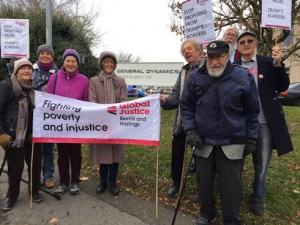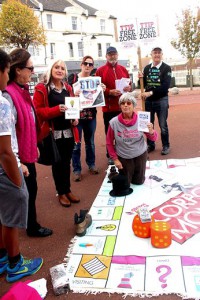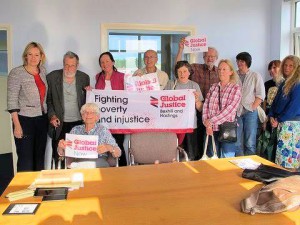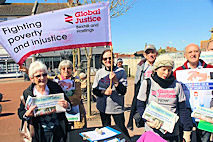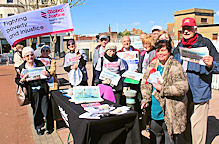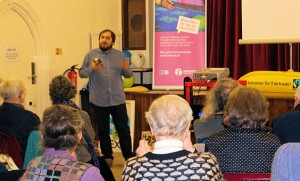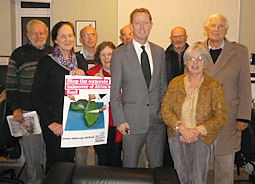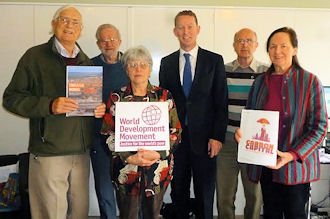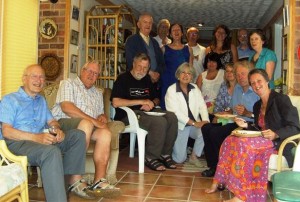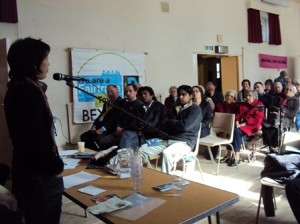Welcome to Global Justice Bexhill and Hastings
We are a small, lively, active group, in existence since 2001, made up of members with expertise in diverse fields. So our meetings are stimulating discussions. We meet every month, usually on the second Wednesday. See our archives.
Email christina.lucey@hotmail.com
GLOBAL JUSTICE NOW MEETS BEXHILL’S NEW MP
A representative group of five met Dr Kieran Mullen MP on Friday 1 November 2024 in his office on Sea Road, Bexhill. This follows many years of fruitful meetings with his predecessor Mr Huw Merriman.
HASTINGS BOROUGH COUNCIL SAYS NO TO FOSSIL FUELS
Congratulations to Hastings Borough Council, which, on 13th July 2024, passed the following motion –
Climate change is threatening hundreds of millions of lives and livelihoods across every continent and is putting thousands of species at risk. The burning of fossil fuels – coal, oil, and gas – is by far the major contributor to climate change and is responsible for almost 80% of carbon dioxide emissions since the industrial revolution. In addition to being the leading source of emissions, there are local pollution, environmental and health costs associated with extracting, refining, transporting and burning fossil fuels.
These costs are often paid by Indigenous peoples of the Global South as well as marginalised communities here in the UK. Hastings is one of the most deprived towns in the country, residents are forced to spend an ever-increasing proportion of their income meeting the exponentially rising costs of energy. Standards of living and health are directly impacted. It is not sustainable to continue to extract and globally transport fossil fuels when genuinely sustainable methods of production may exist locally to meet demand.
Globally, egregious industry practices have led to human rights violations and a fossil fuel system that has left billions of people across the globe without sufficient energy to lead lives of dignity. Failure to meet the ultimate goal of the 2015 Paris Climate Agreement (to limit global warming to 1.5°C) risks pushing the world towards catastrophic global warming.
Yet, the Paris Agreement has no mention of oil, gas or coal and the much anticipated COP26 deal was disappointingly weak. Meanwhile, the fossil fuel industry continues to plan new projects. Banks continue to fund new projects. Closer to home, despite calls from the Labour-led Hastings Borough Council since 2016, East Sussex Pension Funds continue to invest in fossil fuels.
According to the most recent United Nations Environment Programme report, 120% more coal, oil, and gas will be produced by 2030 than is consistent with limiting warming to 1.5°C. Efforts to meet the Paris Agreement and to reduce demand for fossil fuels will be undermined if supply continues to grow.
The solution is clear: fossil fuels must be kept in the ground. We therefore agree:
1. To endorse the call for a Fossil Fuel Non-Proliferation Treaty . That is, for world leaders to work together in a spirit of international cooperation to:
• End new expansion of oil, gas and coal production in line with the best available science as outlined by the Intergovernmental Panel on Climate Change and United Nations Environment Programme;
• Phase out existing production of oil, gas and coal in a manner that is fair and equitable, taking into account the responsibilities of countries for climate change and their respective dependency on fossil fuels, and capacity to transition;
• Invest in a transformational plan to ensure 100% access to renewable energy globally, support dependent economies to diversify away from fossil fuels, and enable people and communities across the globe to flourish through a global just transition.
2. To write to Rother District Council, Wealden District Council, Lewes District Council, Eastbourne Borough Council, East Sussex County Council and the East Sussex Pension Fund, communicating this decision to them and urging them to pass similar motions of their own.
3. To continue to call on East Sussex County Council to commit to divesting the East Sussex Pension Fund from fossil fuels.
NO FAITH IN FOSSIL FUELS
Before the 2024 General Election, Global Justice Bexhill and Hastings held monthly vigils outside the office of Huw Merriman MP.
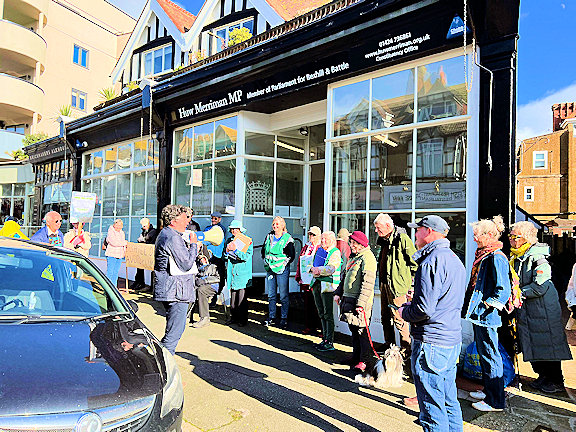
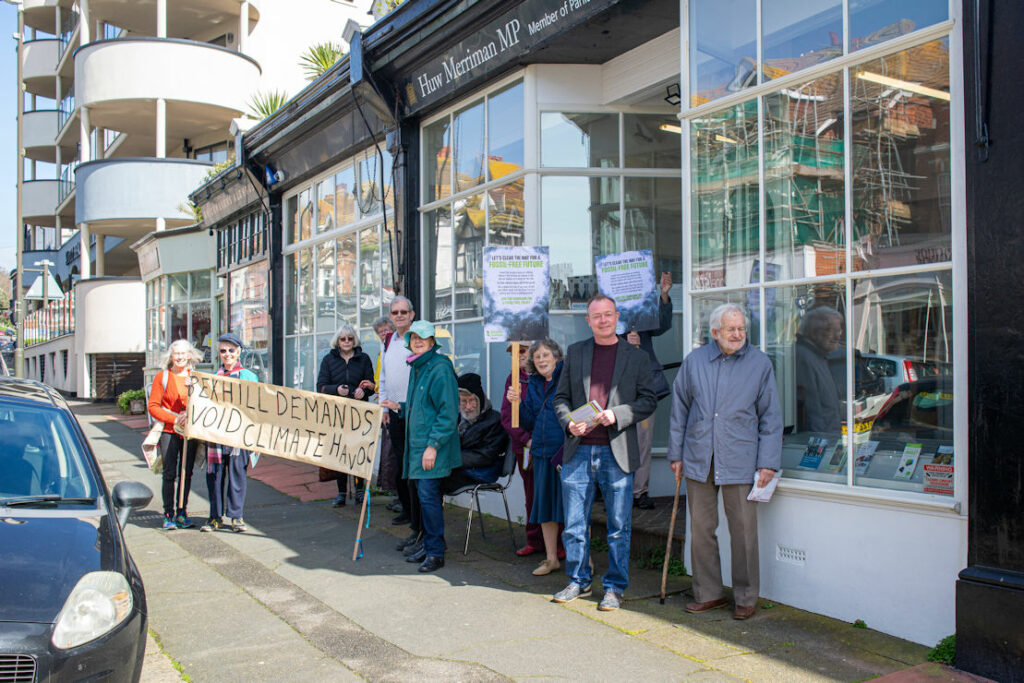
Photo: Jeff Pitcher
Jack Docherty writes –
The Time of Reckoning is NOW – with accumulating reports from around the country and the global borderless environment of climate ‘quakes’ causing sudden destruction of whole environments in our small delicate global environment. Food crops being washed away or dehydrated, ocean destruction eg coral reef bleaching, winds and hurricanes devastation. Reservoirs may not be fit for purpose to hold sudden very heavy torrential rain and dams collapsing and being washed downstream sweeping whole villages away with no respect for populations of people, animals and land. Particulate pollution is getting unhealthily worse impacting on NHS. Climate destruction forcing millions into horrible displacement and migration.
THE PACIFIC TRADE DEAL
The UK signed up to the Pacific trade deal in the summer, but Global Justice Now has not stopped campaigning for corporate courts to be dropped from the deal. We teamed up with Canadian allies to write a joint letter to the UK and Canadian governments, urging them to sign a ‘side-letter’ to exclude ISDS provisions between the two countries – just as the UK has already done with Australia and New Zealand.
The letter was signed by over 30 organisations and 50 experts from the UK and Canada, including Greenpeace, Friends of the Earth and UNISON, and points to how Canadian companies are particularly aggressive users of ISDS (Investor-State Dispute Settlement), with 65 known cases including the largest fossil fuel claim ever – $15bn for Biden’s cancelling of the Keystone XL oil pipeline. You can take our email action asking the trade minister to act on the letter.
REFUGEE ACTION
Refugee Action are asking for support for their campaign on companies who are profiting from multi-billion contracts to run our cruel and punitive asylum system. There is a video and petition to sign and share.
THE SCANDAL OF BIG PHARMA EXPOSED
Author Nick Dearden spoke to local people, including members of Global Justice Now, on the scandal of the way big pharmaceutical companies protect their own business through the patent system. Countries such as South Africa were prevented from producing vital Covid vaccines in their own factories because the large companies held the patent property rights. In his book Pharmanomics: How Big Pharma Destroys Global Health he says: ‘Big Pharma is more interested in profit than health.’
During the book launch at The Pig in Hastings on 13 October 2023, Global Justice Now Director Nick Dearden explained how big pharma ignores diseases which won’t make them huge profits, meaning millions of people suffer from preventable illnesses each year.
Even when new drugs are developed, big pharma companies charge so much for them that many countries across the world often can’t afford them. Even the NHS has to ration access in some cases. Many of the most important new medicines are made with public money. But our current system allows big pharma to privatise and patent these medicines, leaving these corporate giants to decide who gets them and for how much.
Big pharma is failing. We need a new system that puts people’s lives before profit.
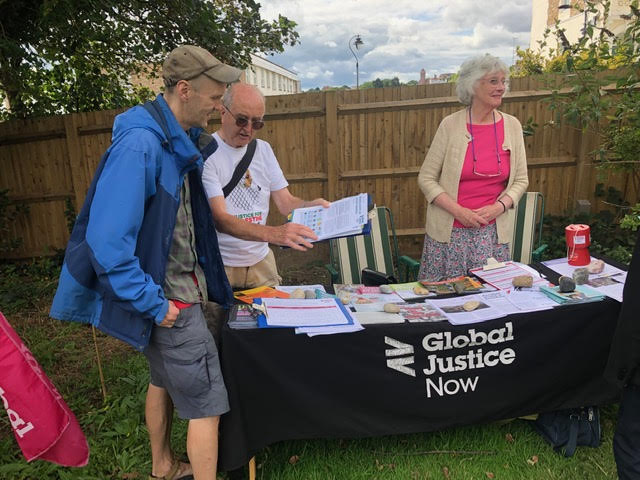
Concordia Hall and its surrounding gardens was the aptly named venue for an Interfaith Forum event held in beautiful sunshine, Sunday 6th August 2023. Global
Justice Now were present with a stall, at which the petition against Big Pharma was the main focus.
The event was very well-attended and since the sunshine lasted the whole afternoon, the stalls, tucked under the trees, were visited by lots of people who came along to be entertained by many music sets by local musicians and to enjoy wonderful Afro-Asian food, not forgetting traditional English cakes with coffee and tea.
The Global Justice Now petition was signed by many and in fact all the sheets prepared for the event were used! There were enquiries and interest shown in follow-up emails and in all the activities of our local Bexhill & Hastings Group. We hope for positive follow-up on our presence at this very pleasant afternoon event. Our thanks to the Interfaith Forum, and the weather!
NORTH EYE
With the controversy and negative publicity against refugees, asylum seekers and migrants surrounding the proposal to house asylum seekers at North Eye we encourage you to find out more about Stand Up to Racism – Bexhill and Hastings. Many of us consider the accommodation at North Eye to be totally unacceptable but want to welcome refugees to our country. The claims of over 70% of those arriving in the UK are accepted and they are given permission to remain. The local Stand up to Racism group need help with leafletting in Bexhill. If you can help or wish to receive their newsletter email: hastingssutr@gmail.com
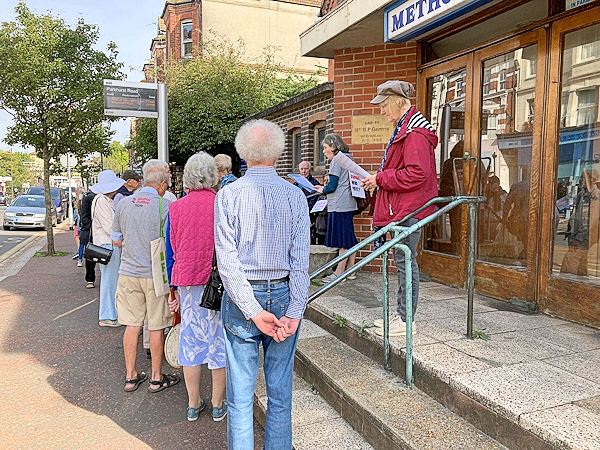
First we assembled at the Methodist Church.
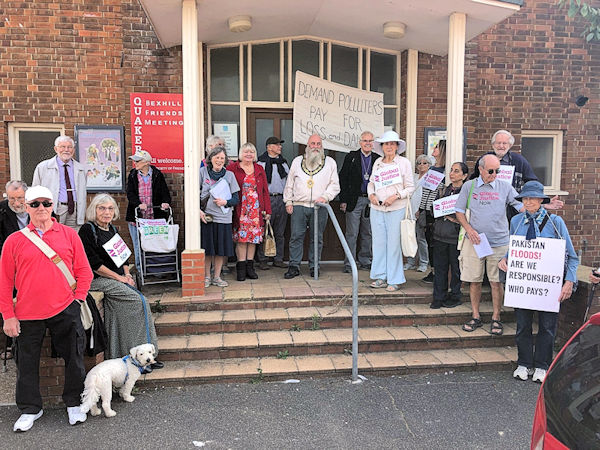
At the Friends Meeting House the campaigners highlighted the $10 billion of damage suffered by Pakistan in recent floods and said that an international ‘loss and damage’ fund could help meet some of the costs. 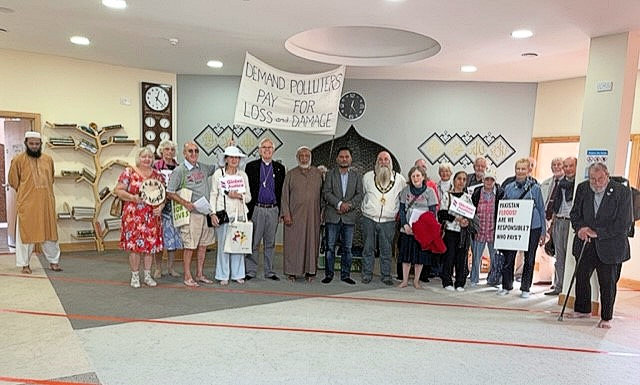
At the Mosque the Imam welcomed the joint efforts being made to ensure that loss and damage financing, which helps countries hardest hit by climate change rebuild, is increased.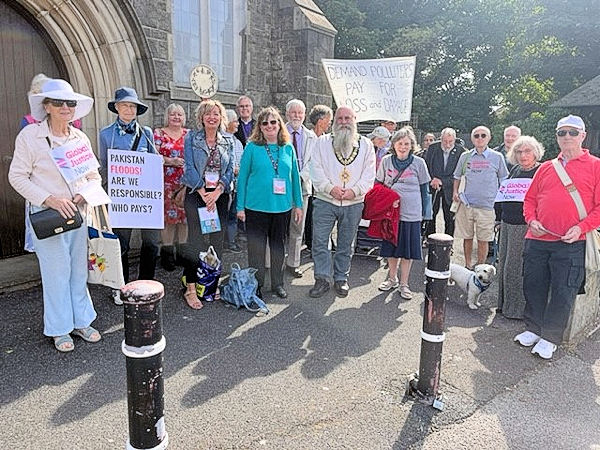
At the Catholic Church walkers called on the UK to tax energy companies for climate damages and use some of the funds to compensate lower income countries.
Ending at the Town Hall Bishop Laurie Green and Bexhill’s Town Mayor Paul Plim both expressed their support for this national day of action to make polluters pay for the climate damage they have caused.
The day of action was organised by the Make Polluters Pay coalition, involving organisations including Global Justice Now, Christian Aid, Faith for the Climate, Cafod, Green Christian, Stamp Out Poverty, Oxfam and the Loss and Damage Youth Coalition. The protest was part of a national day of action that also saw actions take place in Cambridge, Edinburgh, London, Lancaster, Nottingham, Portsmouth and Rotherham.
GLOBAL JUSTICE IN HASTINGS
The GJN Stall at the Peoples Assembly on Cost of Living Crisis Event in Hastings on August 20th 2022 highlighted Trade Deals, Energy Charter Treaty and Fossil Fuels.
Five members from Bexhill travelled by bus to join confreres in central Hastings for the event with other allied organisation including XR. The event featured talks on how to respond to the linked climate and energy, food and transport cost of living crisis. The open discussion groups came up with some great ideas for actions at the community, council and central government levels. The photo shows some members at the stall with relevant GJN informative and inspirational leaflets. And they were very useful!
We engaged many people in conversations and signings. Great positive responses including a new member! What was surprising was a general ignorance of Trade Deals and dominant unjust undemocratic ISDS. People were gobsmacked at rich corporate companies suing governments such as Italy but angry at huge claims by rich Corporates of £100s millions from some of the poorest, starving, drought ridden African, Sub continent and Central America Governments.
Only one person was aware of the unjust colonial-type Energy Charter Treaty quietly – secretly? exploiting struggling developing countries asphyxiating their health and education services. The question perennially cropping up was “how can this unjust imbalance of power be allowed in present world awareness and striving”. “How can Climate Destructors profit from deaths of people, crops, animals and ecosystems”.
We all must try to remove the rhetoric from this and work for the abolition of the Energy Charter Treaty and to expose Trade Deals to the democratic electorate NOW (as our GJN says).
Fossils fuels largely caused climate destruction so their profits and assets should pay compensation for losses and damages NOW.
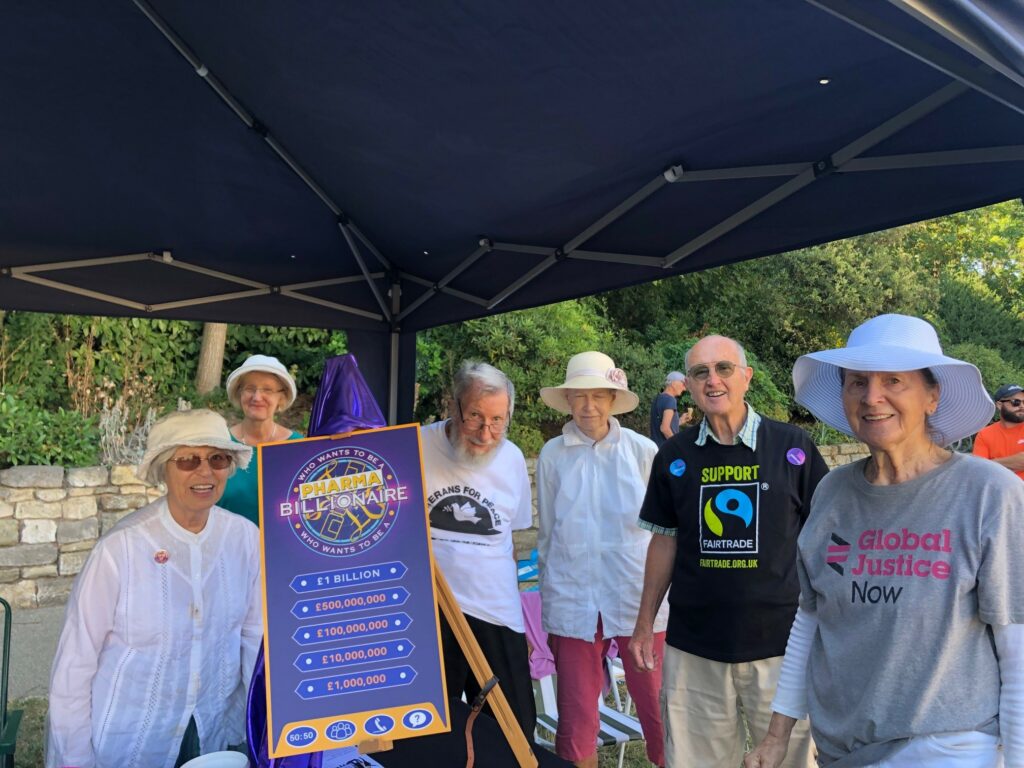
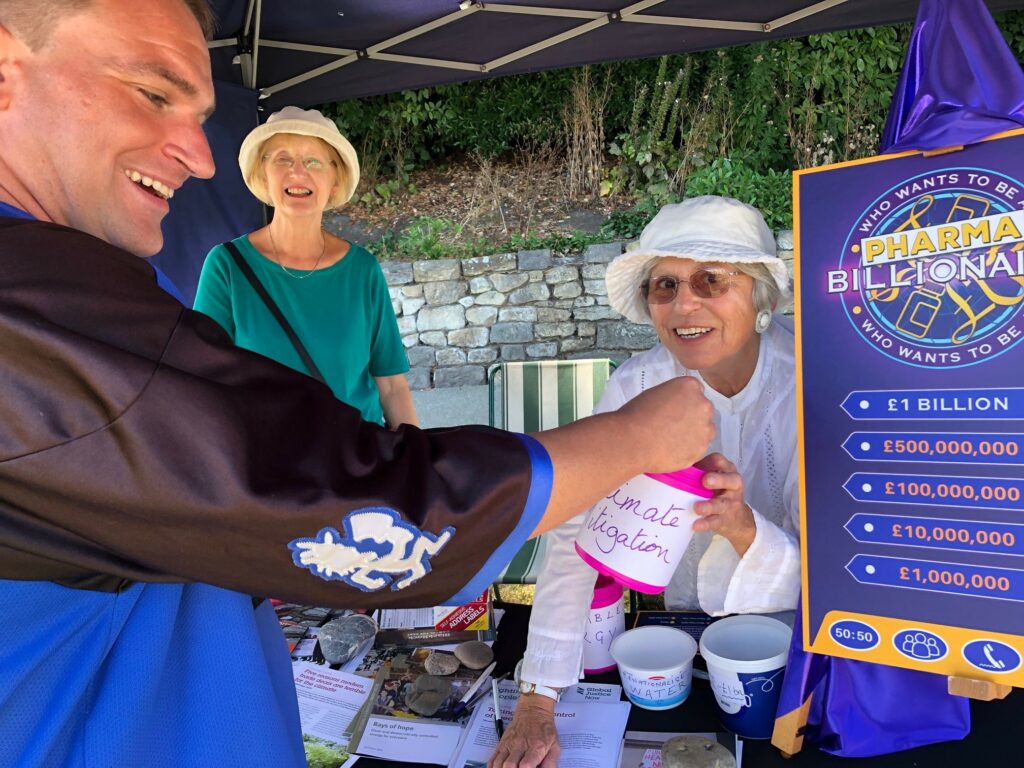
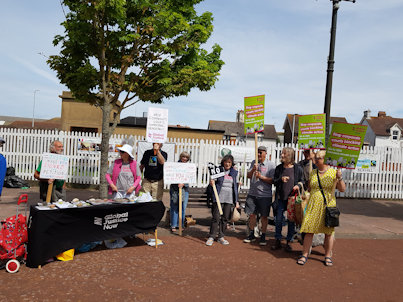
Global Justice Bexhill and Hastings set up a stall in Bexhill town centre on Saturday 21 May 2022 as part of a national Day of Action on corporate courts. Barbara Echlin gave a short talk explaining how corporate courts are an obstacle to countries taking action on climate change.
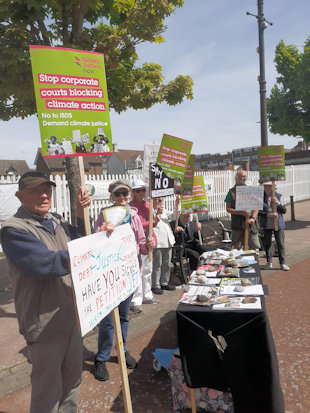
We collected signatures on a petition to Huw Merriman MP (Battle and Bexhill) and Sally Ann Hart MP (Hastings) asking them to prevent the inclusion of Corporate Courts in any future trade deals. Before we deliver the petitions we will be collecting more signatures at two meetings next weekend. You are welcome to attend either or both of these meetings:
-
Saturday 28 May. “ Let’s Talk About Climate Change”. Plan for the future. Organised by Bexhill Town Council. 10am to 1pm. St Barnabas Church, Sea Road, Bexhill.
-
Saturday 28 May. Bexhill & Hastings United Nations Association. Open Organic Fruit and Vegetable Garden. 13 Thornbank Crescent, Bexhill TN39 3ND. 10am-12 noon. 2pm–4pm. Guided tour of garden 11am and 3pm. Entrance £2.
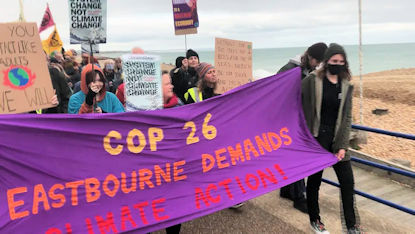
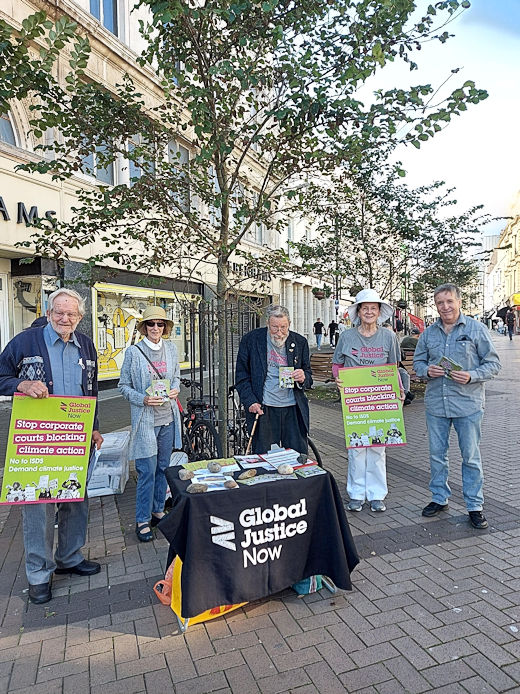
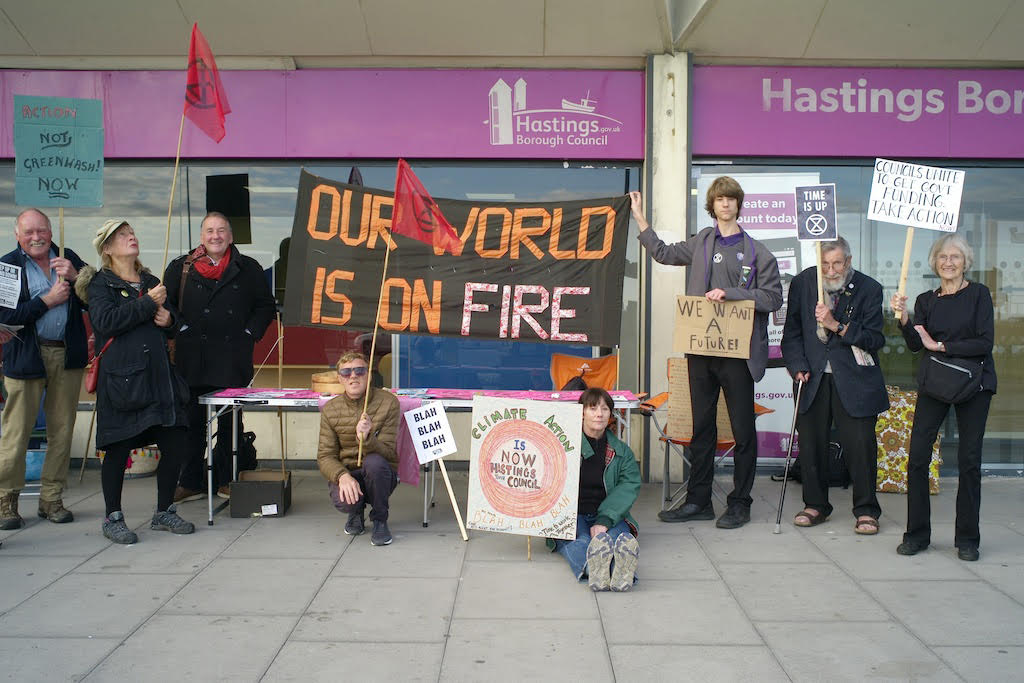
The action culminated in a die-in outside the council offices.
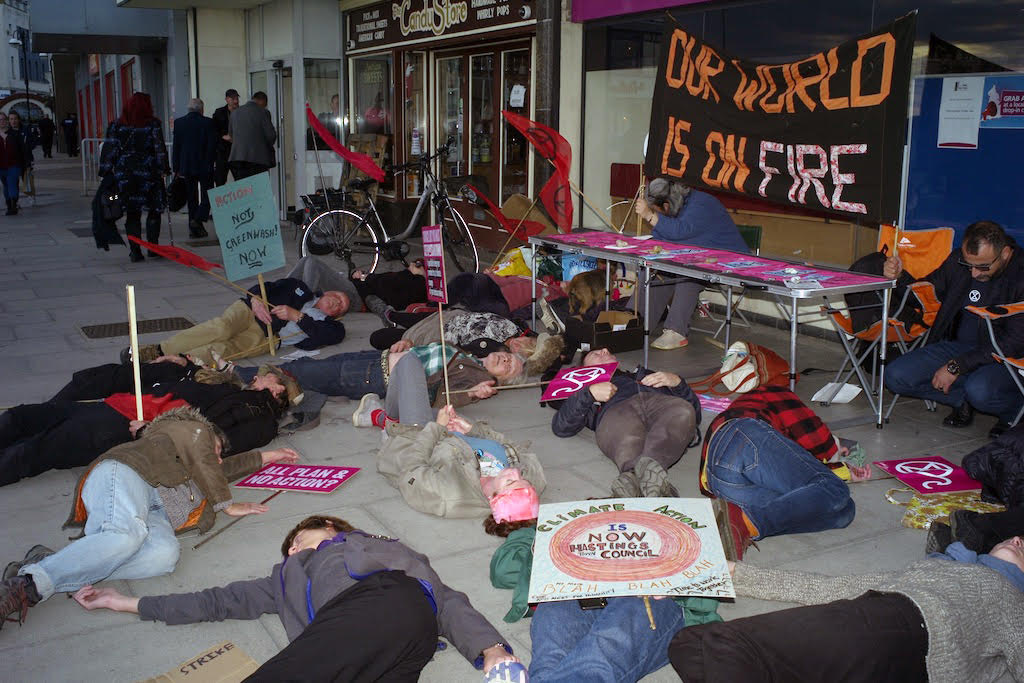
STOP THE U.S. TRADE DEAL
On 24th October 2020, members of Global Justice Bexhill & Hastings held an information table on the US Trade Deal.
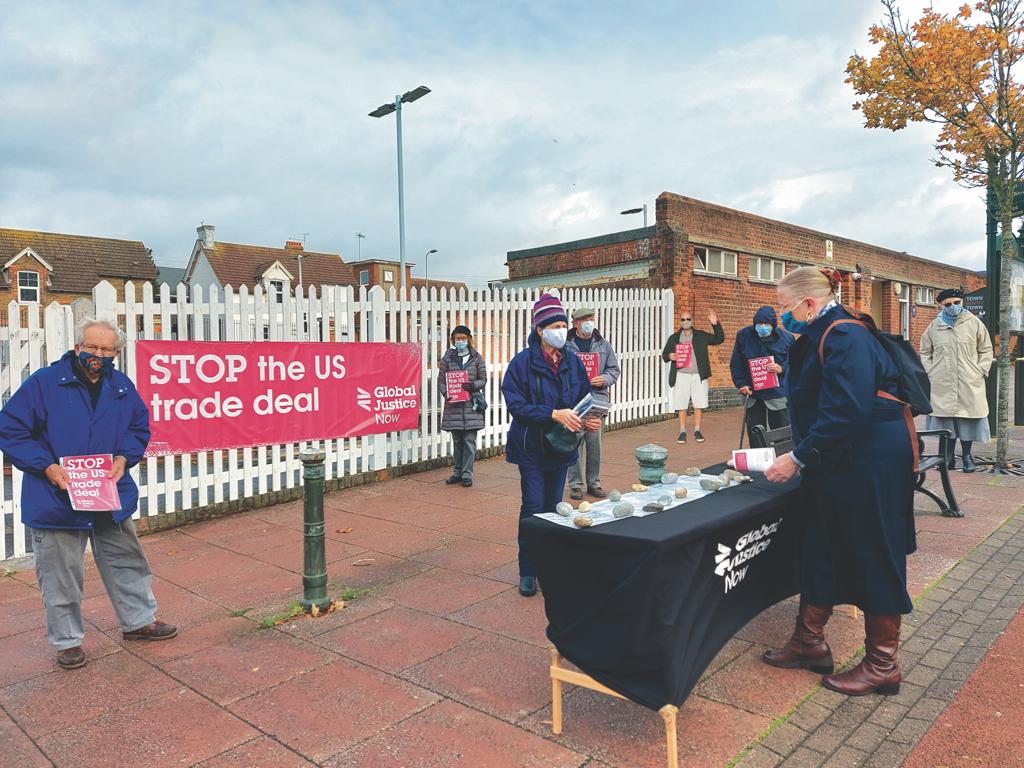
Jack Doherty writes –
> Members of the Bexhill and Hastings Global Justice group made their presence felt in a few locations, as part of the national UK day of awareness of why we should urgently stop the UK US Trade Deal NOW, in these particular times.
> Why is this so important in the midst of a drastic worsening covid pandemic, plunging children into poverty etc ? There are many eerie comparisons about grasping the nettle, quick action, consequences of apathy, denying etc. Hopefully the covid pandemic will be under some control in about 18 months. But the effects of the UK US Trade Deal and its conditions will be severely with us for the foreseeable future.
> Are your foods, water and environment safe here now? Why are US incidences of food poisoning by salmonella and campylobacter several times higher than here and in the EU?
> Modern Trade Deals, especially between developed countries, are as much about regulations as they are about reducing tariffs. This US Deal is one of many being negotiated in secret ( even from MPs !!) and will not even be discussed in Parliament. Why ??
> Liz Truss, minister in charge of International Trade, says we should trust her, even when under pressure as a small economy against Goliaths! Yet she has quietly met with Trump-friendly lobbyists, corporations, fossil fuel expansionists and cronies!
> We, in Bexhill and Hastings, seaside towns, with projected flooding which will occur as sea level rises and with ever increasing powerful and more frequent storms, caused by global warming ocean expansion, will be affected. US negotiators told Britain that it’s not even possible to mention Climate Change during the talks and that it won’t be mentioned in the final deal! A deal for Trump, a climate change denier, will be a Trump deal! Trump wants NHS prescription medicines to be supplied by US Pharmaceuticals corporations. A survey of medicines in 2018 showed that the 50 most expensive NHS PRESCRIPTIONS, costing £1.39 billion, would have cost £6.42 billion on US prices ( Royal Society of Medicines )! Tax payers beware and private health too!
> We don’t allow rat hairs in foods but US regulations allow up to 11 rat hairs per 25g Cinnamon for example !
> For more information read Nick Dearden’s book Trade Secrets :The Truth about the US Trade Deal, online, download ebook free at globaljustice.org.uk/trade-secrets
> The clock is ticking on these pandemics and they will not passively disappear – we can all do something to limit the damage, and our MPs would love to hear from you …. and we would love to hear from them .
Before the meeting I received help from John Lynes (Global Justice) who sent me information on the Hastings against War website and useful links, from Sonia Hartman (Global Justice) who put me in touch with Felicity Laurence (involved in the Buddies Scheme and Hastings Community of Sanctuary), who contacted Safwa Chowdhury (Hastings Community of Sanctuary) who agreed to accompany me to the surgery. I am very grateful for all these people’s support and for Barbara Echlin’s encouragement.
I introduced us both, our organisations and our stance on the refugee situation. (ie We represented the thousands of her constituents who welcomed them, felt sympathy for their suffering and wanted to help them.) I proceeded to hand over our questions for the Home |Office (see below) then to discuss helicopters heard locally and concern re drones (raised by Felicity Laurence), road blocks etc. I tried to avoid people smugglers on the basis that we had so little time. However we ended up with quite a long time because an appointment had been cancelled and SAH did reintroduce the topic.
My concerns re noise and helicopters were seen as exaggerated. Drones were denied. Night time flights as well. Refugees set out during the night and arrive and are met by helicopters when it is light. On one occasion, she had not been given information by the police, even though she was an MP, about police presence and work with arriving migrants when she had, by chance, as she was travelling with her autistic nephew, encountered them. She did not divulge what she might later have found out from the Home Office. She then started to defend the police and how (picking up on my word) compassionately and well, the migrants were being treated. Assertive reassurances of Government compassion and migrant seekers’ comforts punctuated her conversation throughout. She denied road blocks but when I mentioned being told about one from an inhabitant of Pett, she said she was going to see some people from Pett in a surgery.
I had been warned about likely slurs against ‘activist lawyers’. Her tack was that Human Rights Lawyers only ‘do it for the money’. She said what she had said was ‘hard’ but the result of their actions was that the whole process of asylum application was slowed down. However, the proposed new system would solve all these problems by allowing for no appeal. There would just be one unquestionable decision. We had the impression that she did not actually know any details herself about the ‘reformed system’. Her whole tone was quite vague and we felt she contradicted herself.
(Is Global Justice aware of and researching these proposed changes?)
We managed to point out that there was a lack of infrastructure to do the necessary bureaucratic work promptly and cited the information given at a recent Home Affairs Committee Meeting broadcast the previous week. At one point she asked what she was to tell all the constituents who came to her to worry about asylum seekers. This allowed me to tell her what to say to them – that numbers of asylum seekers were down in 2020 overall etc.
She replied to the question about money for asylum seekers (the £37) by saying it was a local authority issue. She assured us that the welfare of people held in military barracks would be attended to although provided no detail as to how. She claimed that asylum seekers are ‘promised the earth by people smugglers’ but again conflated asylum seekers with ‘economic migrants’.
She suggested that asylum seekers should apply for visas and come by plane. We did address this by explaining how alternative routes had been closed off during lockdown and that the resettlement scheme which provided a safe and legal route had been suspended.
Safwa noted that she was adamant about her opposition to indefinite detention mentioning David Davis’s amendment to the bill saying ‘unfortunately the amendment didn’t go through’ yet she didn’t vote for the amendment. Surprisingly, she also seemed open to suggestions about how refugees might make their claims abroad but I am not sure she understood the asylum system as defined in 1951.
We await answers to the questions below.
(In the questions, the constituency of Hastings and Rye is referred to, but we do appreciate that Home Office figures might not be gathered according to constituency, but by county. If that is the case, we should be grateful to receive the details as they relate to East Sussex County).
‘We are requesting you, please, to undertake to ask the Home Secretary the following questions:-
1. What is the function of the helicopters flying over the Hastings and Rye area? Are both military and coastguard helicopters being used and in what proportions? Are drones being used and, if so, for what purpose?
2. What is the estimated cost of this deployment of resources and manpower? What number of asylum seekers have arrived in the constituency of Hastings and Rye during the period these helicopters, etc. have been working?
3. What medical and other support for well being, is available to asylum seekers when they first land in the Hastings and Rye constituency?
4. Why is so much discussion and money being expended on a very small proportion of asylum seekers, those using small boats? (In 2019, 1,890 migrants came in small boats from France, out of a total of 34,354 asylum applicants (about 5.5%). This year the numbers using boats has increased but other routes have not been used, presumably due to Covid-19, so that overall numbers have gone down.) Were equivalent sums spent on
responding to the other 94.5% of asylum seekers in 2019?
5. Would the Government back a call encouraging people to volunteer to offer supported lodging for refugees?
6. As local constituents, myself [Safwa Chowdhury] and my parents (who are senior medical practitioners in Hastings), are concerned about plans to detain around 400 recently arrived asylum seekers in military barracks in Folkestone from next week. I would urge you to ask the Home Secretary what provisions have been made to ensure social distancing and sanitation guidelines are met, and her assurance that healthcare and support needs will be properly assessed and attended to? Furthermore, what is the recommended number of people that can be placed at such a facility?
7. We are concerned about the duration of time that people will be held here for, and what provisions have been made to support local public services to provide necessary
assistance. Will the asylum allowance of £37 per person per week be provided to these asylum seekers to cover their essential costs?
8. There is concern within the community about the welfare of children being held in “short term holding facilities”. I would urge you to ask the Home Secretary to clarify how many children are being held in these facilities, and how will their welfare, legal rights and educational needs be attended to in physical conditions that Her Majesty’s Chief Inspector of Prisons described as “poor” and “unsuitable for overnight stays” upon inspection this year?.
200 former world leaders have written a brilliant open letter about fair access to a covid-19 vaccine. Do read and marvel at the stellar signatories:
https://medium.com/@Oxfam/uniting-behind-a-peoples-vaccine-against-covid-19-87eec640976
EDWARD ECHLIN

GLOBAL JUSTICE BEXHILL & HASTINGS SUPPORTS ARMENIAN PROTESTERS
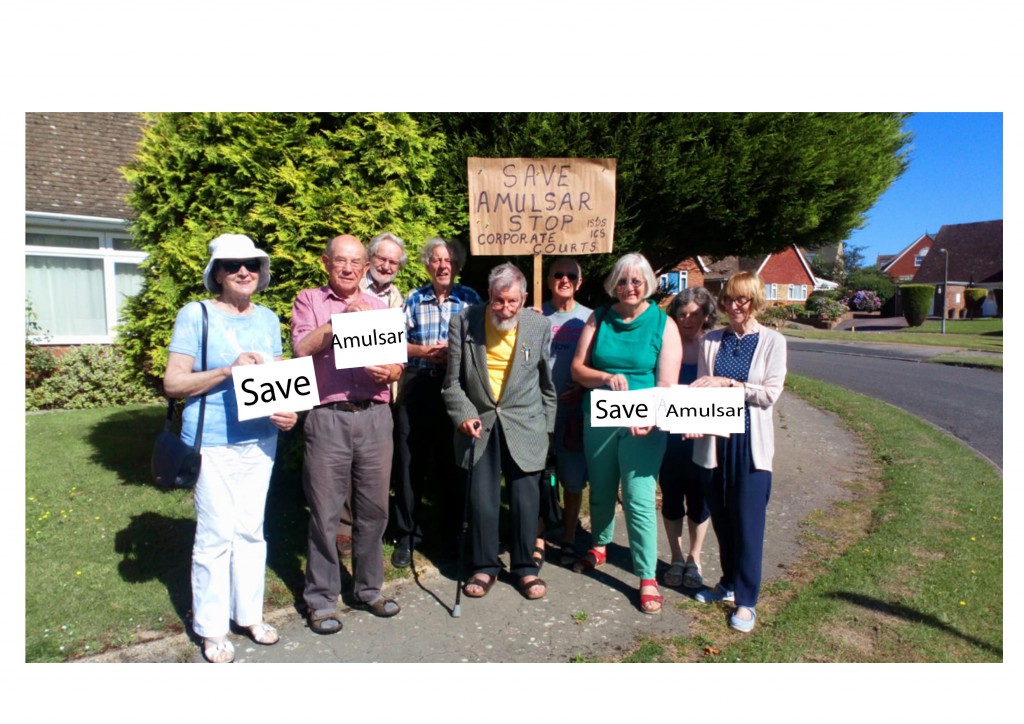 In 2016, a UK-listed mining firm, Lydian International, began construction of the Amulsar gold mine, in the southern mountainous region of Armenia. The mine poses a severe threat to the water supply of the local area and country as a whole, as well as threatening local biodiversity, jobs and livelihoods.
In 2016, a UK-listed mining firm, Lydian International, began construction of the Amulsar gold mine, in the southern mountainous region of Armenia. The mine poses a severe threat to the water supply of the local area and country as a whole, as well as threatening local biodiversity, jobs and livelihoods.
In 2018, Armenia’s ‘Velvet Revolution’ brought down decades of repressive autocratic government to bring new hope of democracy. This presented an opportunity for local communities surrounding the Amulsar mine to ramp up their resistance: they have blockaded the site completely for the past year, bringing construction to a halt.
Hastings and District Interfaith Forum: Garden of Cultural Delights, August 2019

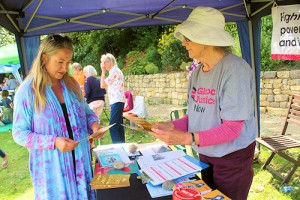
Another successful day at this splendid annual multicultural event. The new Top Trumps game proved to be a useful tool for engaging people with the difficult subject of ISDS (Corporate Courts).
Stop Corporate Courts Suing Taxpayers money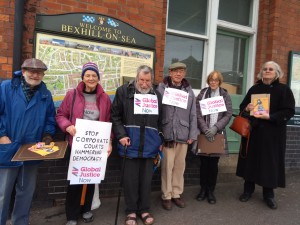
Busy times with things happening at many levels. While the superficial side of Brexit is being fought in Westminster, Brussels and living rooms up and down the country, Government Minister Liam Fox is busy signing post-Brexit Trade Deals in unseemly hurry, the latest this week being with Norway and Iceland (!!).
In these Trade Deals he is swapping much of our sovereignty from Brussels to the big trading corporates who have their own powerful secretive Corporate Courts. These are not transparent and MPs have no say in their terms (what price Brexit !?). Through these secretive courts, the corporates are claiming billions of pounds from several countries if they enact anything which affects their profits, raising minimum wage, health standards; for example, Philip Morris Tobacconists claiming £120 million from the Australian Government because their profits decreased after legislation for plain packaging cigarettes!
It’s time NOW to stop corporates hammering democracy, using this system of (ISDS) Investor State Dispute Settlement. Some countries have stopped it but not us as yet. Terrible to be coughing up these millions of pounds which could be used for healthcare, education, mental health etc.
Campaigners from local group, Global Justice Now, were out on Saturday 16 March 2019 asking people in Bexhill to sign cards to the Government/Liam Fox, for ISDS to be removed from all UK Trade and Investor deals because –
1) they undermine democracy
2) they put Governments off regulating in the public interest
3) they force governments to pay billions to corporations
4) they enforce corporate privilege and they are unnecessary!
See report in Hastings Online Times.
Click here to sign your own card.
Lobbying our local MP

Jack Doherty reports on our exchanges over the cost of prescriptions, and on Fair Trade –
A group of local members of Global Justice Now met with MP Huw Merriman on Friday 1st March to discuss not just the cost of medicines but why it is time for a new Innovation initiative to re-imagine the system urgently.
The situation is in an ever worsening crisis, both here in the UK and around the world, on the cost of prescriptions. The present system of Big Pharmaceuticals having a monopoly on drug prices and Governments accepting, colluding in this, is dysfunctional, costing taxpayers exorbitant sums of money and often not providing access to necessary drugs. In the past year, the NHS spent £20.2 billion on drugs, an increase of 10.9% from the previous year. Even with additional funds the Government is injecting into the NHS, the drugs bill is increasing faster than the budget.
Big Pharmaceuticals cry that Research and Development is very expensive. Yes, it is. But they are slow to announce that the public sector plays a substantial role in the discovery and development of new medicines. Globally it has been estimated that the public funds up to two thirds of research and development of new medicines. The US National Institute of Health, between 2010 and 2016, contributed to the basic research associated with the 210 new drugs approved. In the UK, the Medical Research Council, MRC, ( public money ), gross research expenditure in 2017 – 18 was £814.1 million. In effect the public paid twice : in 2016 the NHS in England spent £1 billion purchasing medicines that had received public investment.
The Patent Laws are out of date and need revising for a modern age of essential inventions for health. They allow 20 years of monopoly pricing of medicines. Two Dutch Ministers, Liliane Ploumen and Edith Schippers are tackling this; they said “ We cannot achieve any real progress without acknowledging that the current patent-based business model … needs to change. The system is broken. Patent and intellectual property exclusivities are the cornerstones of the current model. Companies can ask the price they like.” They are actively seeking to change this as is the Health Department in Canada. There is very strong loyalty to shareholders and financialisation of
medicines. This incentivisation has to be innovated. Companies ‘tweek’ the drug formulae and extend the 20 year monopoly by ‘evergreening’ of high sales medicines. Diseases are rated like markets. Between 2000 and 2010 only 37 of 850 (4%) of newly approved products were for neglected diseases that affect middle and low income countries. There are big problems where many diseases need multiple drugs treatment, and TB is an example, with some innovation strategies suggested. The potential savings from a delinked system in which new medicines enter the market at non-monopoly prices, are vast. The model proposes practical steps that can help transition health innovation towards such a model.
The report, The People’s Prescription, is co-authored by Global Justice Now, Just Treatment, Stop Aids, Medicines Law Policy, UCL Institute for Innovation and Public Policy led by Professor of Economics Mariana Mazzucato, UCL. There was very good discussion between Global Justice members and Mr Merriman. All agreed that the NHS faces ever increasing demands especially with increasing numbers of an aging population and more successful diagnoses of illnesses, not least mental illnesses, at all ages. Mr Merriman promised to think about the innovation required and would value further discussion. Jack Doherty who led for Global justice agreed we needed urgent strategic political action to save our NHS from exploitation of taxpayers coffers. The Report comes with many more facts and authoritative studies / references (312 in all !!), some of which are in this summary. Anyone who would like to join in the discussion please use the email address above.
In addition, we urged Huw to represent our views on post-Brexit trade deals with the developing world where hundreds of millions of poor farmers struggle with exchange rates on their income, often plunging them into starvation and poverty. They need protection from punitive tariffs so they can stay and produce our foods and luxuries and are not driven to emigration, starvation or disease . On both of these points of living income and post-Brexit instability, we agreed our local
economy is also very vulnerable and our vision of assistance for our brothers and sisters locally and globally is critical.
Finally we discussed the targeting of UK aid for overseas development. It is designed to target poverty reduction, disease treatment, disease prevention, fighting drought and climate disasters. We agreed the full amount at least is necessary and none must be siphoned off to the Foreign office, warships or supporting security services in places such as Sri Lanka, Nigeria, Burma or Pakistan. The flow of money out of Africa is about three times as much as goes in, especially through tax havens
and repatriation of profits. The UK and Europe owe a huge historical debt to Africa. The UK Aid budget is a gem in the crown of the UK in an enlightened civilised and compassionate world.
Click here to read an appreciative tweet from Huw Merriman MP.
Global Justice members demonstrate outside General Dynamics Hastings factory
Jack Doherty writes:
On Friday morning, November 23rd, a group of assorted engineers, architects, farmers, teachers, scientists led by Global Justice Now members and supported by anti-war campaigners from Hastings against War assembled outside General Dynamics in Castleham Road, Hastings. They had informed the company in advance and asked to speak to the Director about grave concerns they have about their parent General Dynamics Corporation in USA. There had been no reply from the Director but information that he had a previous engagement. Nobody came to meet them, but they were promised a meeting soon.
They demonstrated noisily and angrily that there should be ‘no profiteering from Trump’s child immigrants situation’. Chants of ‘No Profiteering’ and ‘Justice and Fair treatment for children’ were heard and many passing motorists supported the calls and hooted agreement.
We are all aware of abysmal conditions of starvation, poverty, drug warfare, drought , political assassinations, exploitation and religious intolerance, which drive people to seek a welcome and a better life elsewhere —- one might say these are the historic conditions on which USA was made ‘great’! These people recently fleeing across the southern border into Texas, California etc have an expectation of a country that prides itself in being great again with the Statue of Liberty symbol promising to treat them in a humane way.
The brutal separation of parents from their children and the traumatic caging of children was amended in June because of public outcry. While many parents were deported and their whereabouts now unknown, the children were dispersed into shelters, becoming stressfully overcrowded and on long waiting lists for ‘sponsors’.
Population levels of federally contracted shelters for migrant children quietly shot up more than fivefold since last summer, according to data received by the New York Times, reaching a total of 12,800 in September. There were 2,400 such children in custody in May 2017. The huge increases, which have placed the federal shelter system near crisis capacity are due not to an influx of children entering the country, but a reduction in the number being released to live with families and other sponsors, the data collected by the Department of Health and Human Services suggest. There are more than 100 shelters across the US. There have been concerns of problems reaching dangerous capacity in the shelters. (Mark Greensberg who oversaw this department under Obama has expressed this concern). Congress Representative Rosa De Lauro, the ranking Democrat on the House Appropriations subcommittee that funds the shelter programme, said the facilities cost about $750 perchild
per day, or three times the amount of a typical shelter.
There are great delays in releasing children to placements for many reasons, some of which are good safeguarding but monthly releases have plummeted by about two thirds since last year. The children in detention become more anxious, depressed, violent with each other and staff.
General Dynamics Corporation are involved in this system, providing logistical support to immigration enforcement. They are on the payroll and thus complicit in what is happening in receiving the dollar rewards. Even if they express good intentions in caring for the inmates.
Global Justice Bexhill and Hastings ask for transparency and an end to these awful conditions of
severe trauma for parents, children and their future.
Read the following briefing note from Global Justice Now –
General Dynamics UK is a defence company and supplier to the MoD. It is part of General Dynamics Corporation – a company which works as part of the immigration detention system in the US. As a defence company supplying arms to the UK government, GD UK is implicated in the British arms trade as a whole, which is deeply bound up with human rights abuses. However, by virtue of its connection to General Dynamics Corporation, it is also bound up with the injustices associated with immigration detention in the US, which came vividly to light this summer with the scandal of migrant children being held in cages, separated from their families. This policy was justified in order to deter undocumented migrants from travelling across the US-Mexico border – as US Attorney Jeff Sessions said “If you’re smuggling a child, we’re going to prosecute you, and that child will be separated from you, probably, as required by law. If you don’t want your child to be separated, then don’t bring them across the border illegally.”
General Dynamics provides “IT, transportation, case management, and other logistical services” to child detention centres in the US (source), and “assists the Office of Refugee Resettlement in processing immigrant-children cases” (source). As such, it has been implicated in the detention of children, and the detention industry in the US in general.
Following the global uproar against the Trump administration’s child separation policy, the administration cancelled the separation policy and undertook efforts at family reunification. However, there are still hundreds of children who have not been reunified with their families (and in some cases, probably never will be).
However, the issue runs deeper than the specific case of families being torn apart. Under the Trump administration, the number of children held in detention in the US has skyrocketed to the highest ever levels, from around 2,400 in 2017 to over 12,000 now.
Furthermore, despite back-tracking on the specific issue of family separation, the Trump administration is pushing to dramatically increase the amount of time undocumented families can be detained, as well as to speed up deportation processes.
General Dynamics’ involvement in child detention has led to protest against the company. In particular, there have been a variety of calls for withdrawals of investment from, or contracts with, the company:
- The American Federation of Teachers, the second largest teachers’ union in the US called for pension funds to be divested from GD
- Students and trade unionists from the University of California called for the university to sever contracts with GD
- In the UK, trade unionists from Unite and Unison have called for the divestment of millions of pounds of Scottish pension funds from GD
See also Hastings against War website for further information about General Dynamics.
Hastings and District Interfaith Forum: Garden of Cultural Delights, August 2018
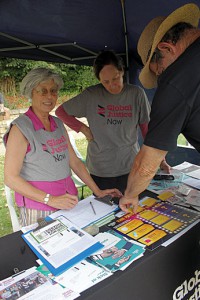
Julia Dance writes –
“Once again we were at the St Leonard’s garden annual event organised by the Hastings Interfaith Forum. We played the new medicines game, “The Price is NOT Right ” to great effect; even several medical professionals were shocked to see the hard hitting evidence it presents. Information from our Migration campaign also went well. We seemed to be talking non-stop for about 4 hours,but , mysteriously, I still was able to consume a few pieces of delicious, homemade cake and two helpings of wonderful curry”.
Devonshire Square. Bexhill, August 2018
The sign says “welcome”, but the message from Bexhill and Hastings Global Justice Now group was to stop the shaming lack of welcome from the U K to people arriving here seeking safety and peace.
Bexhill Hospital League of Friends, June 2018

Global Justice Bexhill & Hastings ran a stall at the annual garden party of the Hospital League of Friends, and were able to hand out a good number of campaign cards to health professionals; they in turn will distribute them to colleagues in Hastings and Brighton as well as in Bexhill.

The Price isn’t right game was very successful in the amount of disgust it engendered over the rise in prices charged for drugs by the pharmaceutical companies.
United Nations Association Open Organic Garden, May 2018

The stall of Global Justice Bexhill & Hastings featured information on the Trade and Pharmaceutical campaigns. Julia Dance dressed as a bee to celebrate the almost complete ban on neonicotines. Unfortunately the celebrations were premature, as the big companies have already found a loophole.
Medicine – for People or for Profit?

In December 2017 members of Global Justice Bexhill & Hastings challenged the Pharmaceutical Industry to stop profiteering from vulnerable people, especially overseas.

Jack Doherty writes –
If you’re ill with cancer or chronic debilitating conditions and medicines and drugs are available, what rights have you to receive them on prescription? Necessary degree? Cost? Criteria? Post code? Poor country? Global Justice Now organisation has researched the cost problem and clearly concluded that artificially greedy high prices can and must be tackled as millions are suffering and dying, affecting families and economies worldwide especially the poorest, while the remedies are kept too expensive.
Local members of Global Justice Now of Bexhill and Hastings campaigned on Friday 1st December, coincidentally World AIDS Day and and met many of the public. There is great concern and anger out there.
The NHS / NICE is rationing many drugs for thyroid, cancers, arthritis etc despite the public sector playing a pivotal role in discovering many of the new medicines. Of the 37 million suffering HIV globally, over half are not receiving anti retro viral drugs and about 1 million die each year. There is a 42% profit margin of HIV drug producer Gilead.
Across all areas of health Research and Development, R&D, the U.K.. government spent £2.3 billion on health R&D in 2015. Globally, it is estimated that the public pays for two thirds of all upfront drug R&D costs.
Drug Pharmaceuticals Companies take out patents on developed drugs. A patent gives a company exclusive rights to a new drug for 20 years. Without competition, companies can demand whatever price they like. They can extend this where minor amendments are made to the medicine. The companies claim they need this to undertake further R&D for new drugs. But when the public purse, tax payers and donations are funding large parts of this R&D, the justification for monopoly is hard to sustain.
Last month, the Canadian Parliament passed a motion with the goal of lowering drug costs and increasing access to medicines, both in Canada and globally.. The new health minister in The Netherlands has announced that the Government wants to ” change the rules of the game” to tackle the “absurd” medicine pricing. He is exploring if he can override drug patents.
Moreover Pharmaceutical companies consistently spend more on sales and marketing than on R&D for new medicines. Many companies also spend disproportionately more on shareholder dividends and buying back their own shares to artificially boost their share price than they spend on R&D.
We call on the Government to save the NHS by tackling this monstrous problem.. We call on NHS patients and future patients ( (!!) to ask our MP, Mr Huw Merriman, to act for us here. The high prices for new medicines are unsustainable for an already underfunded NHS, and put these treatments completely beyond the reach of patients in developing countries as well. Refer also to the film, Fire in the Blood.
Attach public interest conditions and monitoring in the R&D processes.
Introduce transparency with knowledge and evidence of true costs of R&D and what constitutes a fair price.
Develop guidelines for departments that fund R&D on prioritising public health over commercial interests with monitoring and accountability.
Finally, the Government could actively encourage the World Health Organisation, WHO, to support a global biomedical R&D convention which could encourage and enable generic and biosimilar drugs to enter the market affordable for all.
How long have we to wait for action here?!
Jack Doherty
Global Justice Outreach
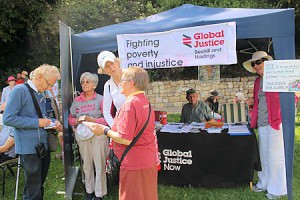
In August 2017 our stall at the Interfaith Festival in St Leonards Gardens included a giant Monopoly board with a Global Justice message.

Two actions in support of small farmers across the world
 May 29 2017 stall at Bexhill and Hastings United Nations Association Open Garden.
May 29 2017 stall at Bexhill and Hastings United Nations Association Open Garden.

April 22 2017 Bexhill Town Centre action to raise awareness of the increasing levels of violence and oppression faced by small‐farmers across the world and asking residents to sign postcards directed to the Foreign Office to demonstrate public support for the UN Declaration, negotiations for which were due to begin in May. Many action cards calling on the UK government to support the UN Declaration and recognise the rights of small farmers, who are crucial for feeding local communities across the world, were distributed and signed. See the May 2017 issue of Think Global.
A Migration Training Session in Bexhill
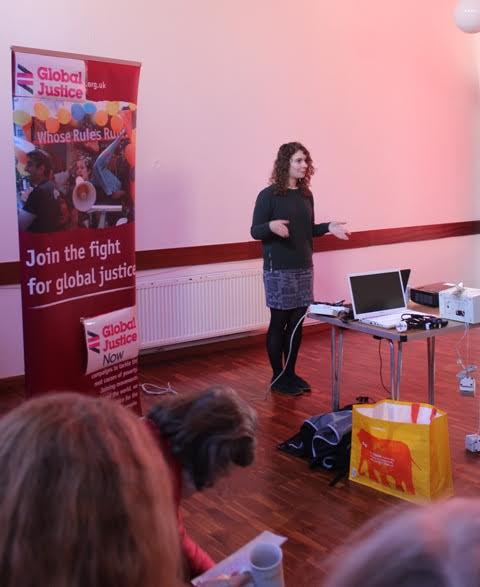
The training was delivered by Jo Hiley of ‘ Hope Not Hate’ (HNH) on January 21st 2017 at the Friends Meeting House, Bexhill. The session was funded by Global Justice Now and organised by members of the Bexhill and Hastings GJN group. There were 27 participants from diverse backgrounds, all of whom were very engaged and concerned about how best to talk to people about migration and other, sometimes difficult, issues.
The training dealt with the following points:
WHO ARE WE TALKING TO? People who agree and those who disagree with us were shown in diagrammatic form as a ‘spectrum of support’. This showed that we succeed best when trying to shift people’s perspective just one notch towards understanding and empathy; the negative remarks people make were outlined as were the ground rules to follow when confronting people; myth and myth-busting was explained.
KEY CONCEPTS: Empathetic listening; asking the right questions
SOCRATIC QUESTIONING: Technique was outlined as a useful tool in discussion
A video was shown of someone using these approaches, successfully, on a doorstep, to discuss LGBT rights.
Finally there was a practice session working in pairs.

IDEAS FOR FOLLOW UP: These ideas have been provided by people who attended –
Further discussion at Global Justice meetings and a possible social event to bring together people of different backgrounds and cultures.
Making contacts with related organisations to give and receive support., e.g The Refugee Centre in Cardiff.
Go to ‘Hope Not Hate’ Facebook page to share experiences and ask for feedback from them regarding their ‘Schools’ Project’.
COMMENTS FROM PEOPLE WHO ATTENDED –
The format of the session was informative, practical and allowed plenty of time for interaction and discussion. The training highlighted that you need to know your topic well and underlined the effectiveness of linking the discussion with local issues if possible.
Learning to listen was stressed as was having conversations rather than arguments in order to convince people.
Jo (the speaker) was brilliant, articulate, thought provoking and professional in facilitating and leading the event.
Looking forward to using and following up on the many skills learnt so that the humanitarian voice can be heard.
Good to be given help to tackle difficult situations by learning to listen and not to think that I must convert this person to my way of thinking. Must remember: “2 Ears, 1 Mouth” i.e. 2 parts listening and 1 part speaking.
PUBLIC MEETING – MIGRANTS
Globally 65 million people are displaced from their homes after fleeing from war or persecution. Over 25,000 migrants have died in their attempt to reach or stay in Europe since 2000. Over 50 people joined the Bexhill and Hastings Global Justice group on Saturday 22 October to ask: ‘What is the real solution? What are the root causes? and What can we do?’ Three speakers tackled the issue from different angles and Mike Surman contributed with a moving song he had composed.
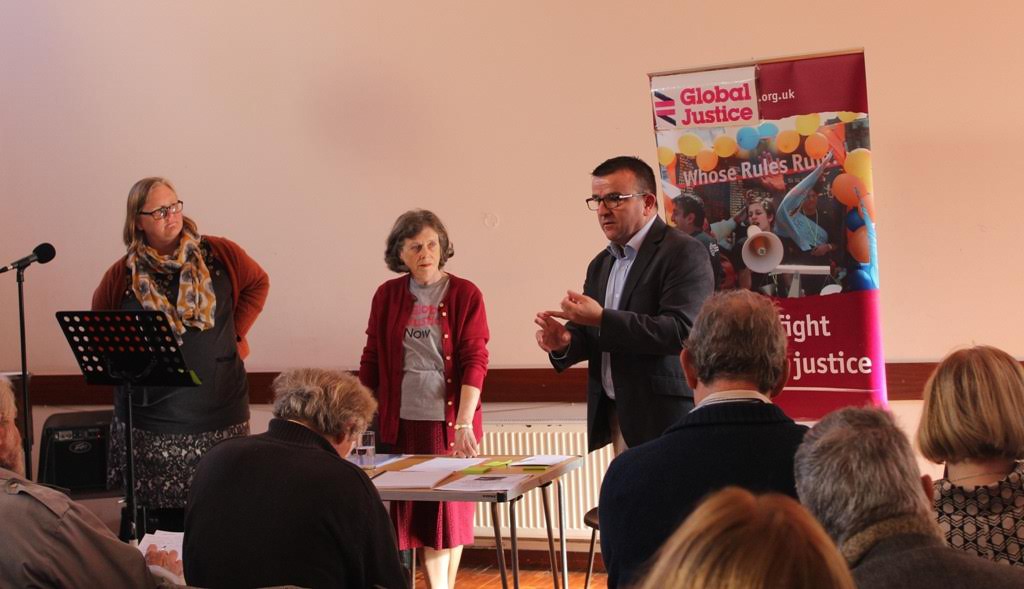
Jane Grimshaw, Barbara Echlin (Chair) and Aidan Cantwell
Aidan Cantwell, the Justice and Peace Advisor for the Catholic diocese of Arundel and Brighton (Sussex and Surrey), started by dispelling some myths. Most refugees are sheltering in the country next door to their own. Turkey now hosts the largest number of refugees. Most refugees in camps in Syria, Jordan and Lebanon don’t want to come to Europe, let alone to the UK. “What they want is to be safe and to be shown respect and kindness in a country that will treat them with the dignity all human beings deserve.”
Aidan explained how the diocese “continues to look for innovative ways of working with a variety of partners to enable as many people in their communities as possible to become engaged in the work of supporting refugees and asylum seekers.” Those partners currently include Voices in Exile in Brighton and the Society of St Vincent de Paul in Hastings/St Leonards.
Jack Doherty explained the Global Justice position on migrants: “The migrant situation is a symptom of what is happening. It will continue and get worse if the causes are not addressed! I believe there are 6 main causes. Where does responsibility lie? Certainly not with the migrants themselves”. He then cited the main root causes driving people to flee from their homes: war, poverty, inequality, climate change, unfair trade deals and colonialism. For example the beginnings of the Syrian conflict were exacerbated by the severe drought in that region causing many rural people to move in desperation to the cities.
Jane Grimshaw from Hastings Supports Refugees gave a graphic account of the splendid efforts made by people in Hastings in collecting food, shelters, clothes, pots and pans and whatever has been needed to make conditions for the migrants in the Calais ‘Jungle’ a little bit better. Jane suggested pressing Hastings MP, Amber Rudd, now Home Secretary, to implement the Dubs Amendment straightaway and arrange for vulnerable children with family in the UK to be allowed in.
An Appeal from Brazil
Peter Bolwell urges us to click here and watch a video of tribal Brazilians desperately resisting expulsion from their land.
Watch this video too –
Global Justice at the Garden of Cultural Delights
Hastings and District Interfaith Forum, August 2016
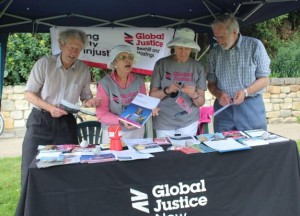
We were pleased to have the opportunity to have a pitch once again at the wonderful annual multicultural interfaith Summer gathering in the delightful setting of St Leonards Gardens and were blessed once more with sunshine. Members manning the stall were very pleased with the great interest shown in Global Justice Now campaigns and the number of people signing up.
Global Justice at UNA’s Open Garden
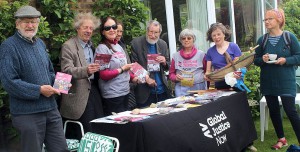
On May Bank Holiday Monday 2016, we were kindly invited to hold a stall at the annual Open Garden event run by the Bexhill and Hastings United Nations Association. The setting – Ed and Barbara Echlin’s beautiful organic, biodiverse food garden – provided a wonderfully apt backdrop for us to spread awareness about Global Justice Now’s work, with a focus on our food sovereignty campaign.
Many interested people shared misgivings about the extent corporate players are involved in our global food systems, and we gathered new signatures for our petitions as well as giving out many leaflets and action cards. But we found that whilst Monsanto may have gained a reputation for being less than exemplary in terms of its ethics and social and environmental impact, the actions – even existence – of the New Alliance are far less well-known.
So what is the New Alliance? And why should we be concerned?
Run by the G7 countries, the New Alliance for Food Security and Nutrition is an aid scheme that claims it will lift 50 million people out of poverty by 2022. The UK alone is pumping £600 million of aid funding into it. However, in return for aid African countries have to make changes to their land, seed and trade rules that benefit big business including Monsanto, Unilever and Nestlé. This is at the expense of the small-scale farmers who in fact supply the majority of the continent’s food. These farmers now face the risk of land grabs, seed privatisation, the spread of harmful chemicals and increased debt, whilst cash crops for export are prioritised by corporations over the food that will feed local communities. No wonder then, that African farmers’ groups have described the initiative as like ‘a new wave of colonialism’.
Global Justice Now activists across the country have therefore been campaigning against this scheme, lobbying our MEPs and demanding that the EU ratifies a strong critique of the New Alliance. And indeed, this work seems to be paying off: a highly critical report has been accepted by the European Parliament, highlighting numerous concerns and shortcomings of this corporate model of agriculture. So we need to maintain pressure on the EU, and to demand accountability from our own government: is this really how we should be spending our aid budget?
We believe, clearly not. Better would be the promotion and financial support of the international movement for food sovereignty. As part of an international alliance that includes farmers, peasants, indigenous peoples, activists and many more, we are calling for a food system that benefits people and the environment, not just the profit margins of big-business. Food sovereignty gives control and ownership of the production, trade and consumption of food to communities, not corporations. And it values sustainability, biodiversity and environmental protection: agroecology, not agribusiness.
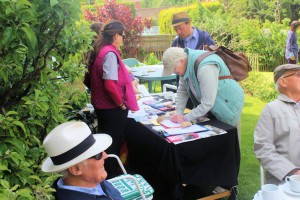
This ethos is clearly alive in Barbara and Ed’s garden, and visitors to our stall couldn’t fail to see the value of it. We hope that many more will join us in our campaign, and help fight for a world where food, land and seeds are where they belong: in the hands of the people who need them to survive.
Beware Roundup
Soon the EU is to decide whether or not to relicense Monsanto’s flagship weed killer Roundup. Roundup contains the dangerous chemical glyphosate which is “probably carcinogenic” according to the World Health Organisation.
Around the country concerned citizens have been adding a health warning to Roundup packaging. This example was spotted in Hastings Morrisons supermarket:
“This Changes Everything”
On 18th January 2016, Bexhill and Hastings Group of Global Justice Now showed a film, This Changes Everything. It raised many issues both globally and locally.
Locally because Hastings MP, Amber Rudd, and recent Bexhill and Battle MP, Greg Barker is/was Secretary of State for Energy and Climate Change respectively.
Jack Docherty writes:
Using stunning cinematography, and narrated by the author of the book of the same name, the film visited seven locations across the world from China and India through Africa to Canada, showing catastrophic changes locally having global effects.
Naomi Klein, the author, was not much interested in Climate Change till about 9 years ago. Intense research and interviews produced the book This Changes Everything with an astounding 887 endnotes/references. Science started to warn, 120 years ago, of severe atmospheric effects on the planet’s environment. The rampant industrialisation over the past 200 years has moved from need to greed. The main ingredient has been burning reserves of fossil fuels, coal, oil and gas with discoveries of uses for aluminium and other metals and plastics to produce limitless objects for home and transport ‘developments’! But there is the by-product of relentless CO2 ……
Everything is changing. The CO2 is causing temperature increase in our atmosphere — unfortunately referred to as ‘warming’ which feels good !
This dries soil and evaporates more water from oceans and seas which cover 70% of the earth’s surface. This heat inevitably gives more energy and water which drive winds, tornadoes, rain and snow to new record levels!
Mining industries for coal and minerals and for fracking are unleashing wastes and poisons into our water supplies, our air and soil supplying our food! Eating and drinking our waste!!
Our global waste bin is full and overflowing!!
What if this is not just a crisis? Who is in charge of this ‘progress’? Is there an alternative? What will it cost ? Is there a choice? What environmental problems are we passing on to our children, grandchildren and future generations ?
A large section of the refugee crisis stems from climate change, droughts, flooding and resulting starvation eg Syria 2000 to 2006, Ethiopia, Sudan, Darfur. The droughts and refugees will continue to move north in greater numbers from parched land and desertification. Are we driving them towards us !?
The Paris Climate Agreements in December are based on keeping the temperature increase to 1.5 to 2 degrees, which is near the precipice anyway! Scientists have done the relatively simple calculation of how much coal, gas and oil can be burned to produce the CO2 which will bring this about by 2030. And, would you believe the fossil fuel corporates have five times that amount in reserve !! The film showed the graphic contemporary evidence for this. It also showed the devastation on habitats from misty smoggy Beijing residents in masks to multiplying coal-fired power stations in India, to ruined areas about the size of England with tar sands in Canada. In all these and more, there is growing dissatisfaction and anger in local communities who recognise the false dawn and who are suffering.
The best place for fossil fuels is to be left in the ground where they are.
The Swedish researcher, Andreas Malm, shows when the rise of neoliberalism allowed corporations to outsource dirty industry to low cost countries and China, there was a spike in global carbon emissions. There’s a causal link between cheap disciplined labour and raised CO2 emissions. The World Bank and International Agencies have warned we’re facing a calamitous global temperature rise of 4 to 6 degrees.
Can this be altered? Germany has moved from 6% renewable energy sources to 26%. The UK is on course to reduce solar! There are about 1 million jobs being developed in renewables in S Africa. The intelligent planning for 24/7 use of non-polluting wind, air, sun and tide is blindingly obvious both in the West and the developing South and East (continents). The moral argument of ‘The Polluter Pays’ places large responsibility on our taxing shoulders for the past and to take evasive mitigating action for the future. We elect our governments to protect us from foreign invasion which now includes air and water invasions which are threatening our survival. We must also help China and India to stop surrounding us in earth- warming CO2.
There was both a lively and sombre question and answer session on these issues after the film. Discussion was chaired by Christina Lucey of Global Justice Now aided by Barbara Echlin, John Fowler and Jack Doherty. Concern was expressed about the power of the fossil fuel conglomerates and over-arching greed and, not least, their power in the US over both political parties and consequently over Congress. In spite of their astronomical profits they received over $1 billion in governments subsidies. The $45 billion made in one year by Exxon is the most of any company ever. Why not nationalise Energy Companies? Germany is moving that way.
The effect of methane emissions from cows is 25 times worse than CO2 for the atmosphere; so we have a responsibility to reduce our high meat diets (apart from for health reasons also).
Will this film change anything? The answer is NO! But each individual in their own life choices CAN and each MP/Councillor MUST change our direction and grasp the difficult choices. Why not make it a building regulation to have solar panels on every new house, a small percentage price addition but equivalent to a clean power station and providing employment!
Be part of the change!The Paris Climate Talks: A Message from Bexhill
As the Paris climate talks began hundreds of thousands of people all over the world marched calling for radical and fair action on climate change at the conference. Even moderate climate change will cause further droughts, famines and suffering that will fuel conflict and terrorism. In Bexhill a group of Global Justice Now supporters handed out newspapers setting out hopes for climate justice at and beyond the Paris meetings. Group member Julia Dance commented “Despite it being a cold and blustery day, our group was set to spend an hour distributing the Global Justice 100+ copies of the newspaper, but they were all snapped up within half an hour. We were aware that a good proportion of people were already very knowledgeable about climate change and keen to learn more from the free newspaper.”
One question asked was, ‘How do we solve climate change?’ Barbara Echlin responded, ‘Simple! Stop burning the fossil fuels coal, oil and gas which puts everincreasing amounts of carbon dioxide into the atmosphere thus retaining more of the earth’s heat and changing the climate. But will the Paris climate talks put that solution into practice? Changing the way we produce energy from fossil fuels to renewables or nuclear is expensive. And that brings in the question of fairness. The rich nations have put the CO2 into the atmosphere for two centuries and have caused most of the problem. The poor nations reckon the rich nations should pay the bill. Getting agreement on that issue is what caused the Copenhagen climate talks to fail. This time most of the 195 countries meeting in Paris have made climate plans showing how they will get their emissions down. One trouble is that these plans are not enough to keep the expected warming below the accepted ‘danger threshold’ of 2 degrees C above preindustrial levels. So the other vital thing those in Paris need to agree on is to meet every five years to revise their plans and to have some way of checking that everyone is doing what they say they will do.’
The outcome? Barbara was right! See also the report in Hastings Online Times.
INTERNATIONAL TREATY THREATENS LOCAL DEMOCRACY
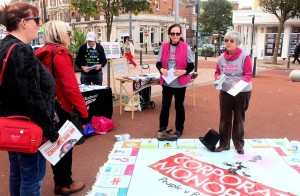
Global Justice Activists meet the Minister
On Friday 11 September 2015, local members of Global Justice Bexhill and Hastings met Hastings MP Amber Rudd.
After congratulating her on her elevation to the Cabinet as Secretary of State for Energy and Climate Change they questioned the priorities of her Department.
Priorities
• Feed-in tariffs are being cut
• Subsidies for solar energy, on-shore wind power and biomass conversion are being reduced
• The Green Deal is being abandoned
• Zero Energy targets for new buildings are being postponed.
At the same time –
• Nuclear energy is promoted
• Fracking is encouraged.
In the run-up to the Paris climate negotiations these priorities are at odds with recent initiatives in America and China to cut greenhouse gas emissions. Global Justice Now fears that people in the Global South, who have contributed little to global warming, will be the first to suffer as their wells run dry and their crops fail.
Amber Rudd responded by asserting her own three priorities –
• Cutting fuel bills
• Security of energy supplies
• Reduction in carbon emissions.
Climate Change
Amber Rudd agreed with Pope Francis, Desmond Tutu and Angela Merckel that climate change poses great risks to the human family. She was disappointed that, on the doorstep, this issue was not raised during the General Election by her constituents.
Her visitors insisted that climate change should now be treated as a moral issue, not merely as an economic or political issue, in view of its effects in the Global South.
The Paris Conference on Climate Change
Amber Rudd was anxious for Britain to show leadership in preparations for the Paris Conference, by ensuring our reliable energy provision at home, and by maintaining our overseas aid budget giving confidence of continuity to recipients.
Energy Security
Amber Rudd justified generous treatment for the nuclear industry – guaranteed tariffs for about 35 years – on the grounds of its independence from overseas sources of fuel. Solar and wind could not guarantee round-the-clock energy.
This generosity contrasted with coolness towards tidal, wave and other sources of renewable energy.
Coal and Gas
Amber Rudd placed her confidence in carbon capture and storage, despite the questionable economics.
On-shore Wind
The Conservative election manifesto had promised a reduction in subsidy for on-shore wind. Wind farms could still get planning permission if desired by the community, but would have to be financially viable without subsidies after April 2016. A few on-shore wind companies have been willing to go ahead unsubsidised, suggesting that the industry is ready to survive the withdrawal of the subsidy.
This was seen as discouraging a proven resource for decarbonisation.
Solar Energy
Amber Rudd cited a report commissioned before the General Election which had recommended an 87 per cent reduction in feed-in tariffs. No final decision has been taken on this, but a significant decrease is certainly intended. In addition much of the profit from the solar industry has gone to overseas companies, at the expense of British taxpayers.
Again the effect of Amber Rudd’s decision was felt to be discouraging.
Zero Energy Homes
Amber Rudd maintained that energy-efficient homes would be more expensive and would take longer to build. The Building Regulations deadline for new zero energy buildings is therefore postponed in favour of maximising the number of new homes.
This relaxation has penalised energy-conscious builders and professionals who had been gearing up for zero energy construction.
Community Energy
The one moment of all-round enthusiasm occurred when Amber Rudd warmly supported the Nottingham Community Energy initiative. Could we hope for a similar initiative in Hastings and Rye?
“Food for Thought”
On Friday 1st September a joint meeting of Hastings Against War and Hastings & District Interfaith Forum watched an inspiring new film Seeds of Sovereignty. It highlighted the crisis in the Global South as indigenous sustainable farming gives way to a multinational commercialised agricultural system, geared more to filling our supermarkets than to the survival and welfare of the farming communities. This has political, social and spiritual consequences.
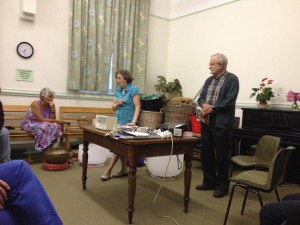
The two speakers, Barbara Echlin and John Fowler, both members of Global Justice Bexhill & Hastings, spoke from personal experience about the need for agro-ecology and food sovereignty.
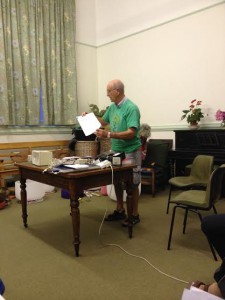
Jack Doherty introduces Global Justice Now
Finally Jack Doherty introduced the work of the local Global Justice group.
See the report in Hastings Online Times.
St Leonards Gardens, August 2015
TTIP and the European Parliament
Negotiations on TTIP (the Transatlantic Trade and Investment Partnership) and the ISDS (Investor to State Dispute Settlement Mechanism) are ongoing. The following extracts are from statements by local MEPs on the current debate in the European Parliament.
Richard Ashworth, MEP (Conservative)
The negotiating mandate given to the Commission by the Member States (including the UK) contains a request to possibly include an ISDS clause that would allow investors to initiate proceedings directly against the US government should they believe that their property has been expropriated illegally, or if they have been discriminated against by the country in contravention of the commitments contained in TTIP.
Member States including the UK want to encourage foreign investment and seek the benefits that this brings. It therefore seems right that such investors can rely on nations to act in accordance with the trade agreement. It is akin to a claim for damages where a government unfairly breaches a contract.
I am reassured that both the EU and USA are committed to ensuring that legislation reflecting legitimate public choices, e.g. on the environment, cannot be undermined through ISDS claims.
Catherine Boarder, MEP (Liberal Democrat)
I am particularly concerned about the proposed Investor-State Dispute Settlement Mechanism (ISDS), I think that ISDS in its current form is seriously flawed. As has been seen in past agreements, secretive tribunals using private arbitration give too much power to multinational corporations and undermine the democratic process.
At the same time, UK businesses do need some form of protection from arbitrary decisions by foreign governments when they invest overseas, including in the US where legal systems can vary from state to state. That is why I will be voting to get rid of the flawed ISDS with the aim of replacing it with a new form of investor protection, one that protects the investments of companies overseas but in a fair and transparent way.
I want to see private arbitration scrapped not only from the ongoing TTIP negotiations, but from all trade deals around the world – including those with developing countries where it has been abused in the past. Many countries in the world are already turning against ISDS. I believe the EU should lead the way in replacing this flawed system with a public International Investment Court, dragging these secretive decisions into the open and ensuring judges are appointed independently.
Annaliese Dodds, MEP (Labour)
Labour MEPs are supporting an unambiguous amendment to this resolution, calling against the inclusion of ISDS in TTIP.
Labour MEPs have also tabled a series of amendments to call for a full exclusion of public services. We have developed these amendments together with public services users, providers and employees and are confident that the legal language we propose is absolutely watertight.
We have also tabled amendments to defend our standards, notably in terms of regulatory protections for workers, consumers and the environment, as well as food safety.
Keith Taylor, MEP (Green)
The Greens and I want to see an exclusion of public services from the scope of the TTIP , a commitment to ensuring that regulatory cooperation between the EU and the US doesn’t end up watering down our current standards, and, of course, the exclusion of the ISDS mechanism.
The TTIP is also set to include a strong focus on regulatory cooperation, but the Greens are concerned that the social and environmental standards in the EU and the US are very different and that governments could find their national legislation on many crucial issues – such as fracking, GM produce and hormone beef – coming under pressure.
I would like to assure you that I will not vote in favour of the TTIP if it contains ISDS provisions and unless significant changes are made to address the objections of the Greens and EU citizens.
Remembering Denis
The following tribute to our beloved chairman, who passed away on Wednesday 27th May, appeared in Hastings Online Times –
Bexhill loses leading justice campaigner
The death last Wednesday of Denis Lucey , chairman and leader of the Bexhill and Hastings branch of Global Justice Now, has been described as “an awful loss” to the ranks of Bexhill and Hastings’ campaigners for a fairer world. Fellow fairtrader and activist Jack Doherty pays tribute to Denis’s many contributions to the causes he passionately believed in.
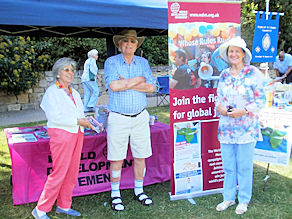
Denis at St Leonards Gardens with Christina (right)
Denis, 88, was a committed campaigner who, with his wife Christina, belonged to various groups which worked in the community such as Bexhill Fairtrade Committe, CAFOD, the official aid agency of the Catholic Church in England and Wales, and Global Justice Now, as the World Development Movement (WDM) has renamed itself, and was a familiar sight on our streets taking part in many activities in his fight for a fairer world.
Denis was a gentle giant in our midst, always smiling but driven with a determination for justice, fairness and transparency. His vivacity and enthusiasm belied his age. Until very recently he was setting out stalls, dressing up for street demos and doing his delicate caring for his garden. He and his wife Christina have been key members of St Mary Magdalene Parish and choir for years.
Denis’s wisdom and sagacity at meetings will be sorely missed. As well as being an all-round loveable man for family and friends, he was consumed with a desire to actively change the lives of people, especially the voiceless and deprived.
Denis, of Maple Walk, grew up in north-east England but went on to travel and teach in Argentina where some of his children were born. On returning to Britain he settled in Bexhill where he worked as a language teacher in Downs Secondary School for boys in the mid-1960s.
In 1968 Denis played an active part in the action mounted by the National Association of Schoolmasters (NAS) to safeguard teachers’ positions when schools were reorganised and amalgamated – Bexhill was where the national principle was won and established for future negotiations. His first wife Patricia taught languages in St Mary Magdalene primary school.
With their four children – Michael, Tony, Ana and Helen – they became life-long friends with fellow foreign language teachers Christina and Val Bowler, and their children Joseph and Margaret, sharing a common interest in multilingual cultures. After both Denis and Christina were bereaved, their friendship blossomed and they married 15 years ago.
In about 1970 Denis left Bexhill to become deputy head of Chatsmore School in Worthing. Here he became active in the local branch of the World Development Movement and continued this work on returning to Bexhill, along with his wide aim of combating inequality in the world. This led him to support Fairtrade and take part in demonstrations such as highlighting the monopoly practices of the banking and corporate world in food production and pricing. He used a fair lens of justice and peace.
He joined the Jubilee 2000 movement for debt cancellation in Worthing and Bexhill in 1999 and participated in marches in Cologne. After this, together with local vicar Helen Dollenson, he resurrected the local Bexhill and Hastings WDM which he led vigorously and inspirationally from then on.
He and Christina have been on marches in Prague, Copenhagen, Brussels and Paris, as well as many cities and towns in the UK. He lobbied MPs and MEPs on a range of issues, including the controversial Transatlantic Trade Investment Partnership (TTIP) under negotiation by the United States and the EU.
Among other fellow activists who have mourned his passing are Philippa Coughlan, who commented, “Denis was the epitome of a caring and a real gentleman; this is an awful loss,” and Lesley Shareif, who said, “We have all been enriched by working with Denis.”
Protect bio-diversity

On Spring Bank Holiday Monday the Bexhill and Hastings Group of Global Justice Now took part in the annual Open Garden event of Bexhill United Nations Association. This was held in the garden of Barbara and Ed Echlin, renowned for its bio-diversity.
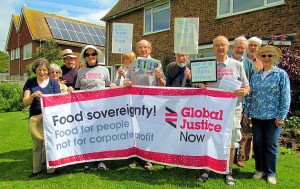
The Global Justice Now stand warned that multinational agri-business corporations are pushing their own patented hybrid seeds to become the only seeds in future farming in the world’s poorest countries. Global Justice Now promotes the perpetuation of the diverse seeds that small farmers use in developing countries to control their own food systems, protect bio-diversity and build resilience to climate change.
TRADE JUSTICE
The movement against TTIP and other undemocratic trade deals is growing fast. On 18th April thousands of people took part in more than 700 actions across the world to protest a new generation of neoliberal trade agreements that are threatening to undermine democracy.
In Bexhill, Global Justice Now supporters and other activists took to the streets and Devonshire Square in solidarity with supporters in 32 towns and cities in the UK to put an end to the EU-US trade agreement. The targets are the corporations that could use TTIP to grab control of our NHS, our food, and our environment. Members spoke to passers-by about TTIP and an amazing finding was that less than 10% of people actually knew about this Treaty which is being negotiated in our names and which, if it comes into force as proposed this summer, will affect all of our lives for many years. It poses threats to democracy, public services, food safety, our environment, workers’ rights, personal privacy, financial controls and not surprisingly has been negotiated largely in secret!! Even many MPs and MEPs are unaware of who and what is being agreed. David Cameron could have fought to have the NHS included as an exemption but has chosen not to. TTIP is set to remove many of the new financial regulations (such as banking safeguards) which have been introduced since 2008 to prevent a future financial crash. Many people said they wanted to hear from our candidates what they propose to do on these matters. Some countries such as Ireland will need a referendum to deal with this Treaty but here in the UK it might not even be debated in Parliament!
Denis Lucey, chair of local Bexhill and Hastings Global Justice Now Group, said “Saturday was an important moment for our movement for a more just world. In the run-up to the general election we have shown decision-makers that we are ready to stand up for our democracy, our public services, our food and our environment”.
Julia Dance proclaimed optimistically “The good news is that if we stand together we can stop TTIP”. Have we time?
The campaign was resumed on 24th April. Group member Jack Doherty reported: “We had a good group taking part in the 38 Degrees appeal Save our NHS, filling many sheets with signatures to save our NHS from take over by corporates, and especially to have it exempt from TTIP. There’s a lot of work to be done for our fair democracy as very few people know about TTIP and even fewer know about important details affecting hard-won safety rules for our food and animal welfare. We need to accelerate our work before polling day. Three of our prospective candidates turned up — Labour Michelle Thew, LDP Rachel Sadler and UKIP Geoffrey Bastin, each of whom signed our petition. It is fair to say that Michelle was most in command of TTIP details, safeguarding on NHS and other factors”. Christina Lucey added “ It was good to be able to tie this action into our Global Justice action the Saturday before. The candidates were keen to learn about TTIP and were pleased to be offered copies of the ‘NoTTIP Times’, some taking a number of copies to give to their members”.
IN WHOSE INTERESTS?The corporate takeover of food and trade
To mark our change of name, from the World Development Movement to Global Justice Now, we joined with Bexhill Fair Trade Group in presenting a great evening of films and discussion about power and inequality across the world, and what people both here and in the global south are doing about it.
“A rich mix of documentary film and live expert input brought the conflict between global agribusinesses and family farming in the poorest countries vividly before an appreciative audience of Global Justice, Fairtrade and CAFOD supporters,” commented Julia Dance.
The first film, Seeds of Freedom, illustrated how corporations are taking control of food production worldwide and the effect this is having, especially in the global South. These farmers spoke movingly of their traditional ways of caring for their land, feeding it organically and saving a variety of seed for use in future years. Their love for the land and care for it was very moving. Their very existence has depended on it for many generations. Barbara Echlin, well-known locally with her husband Dr Edward Echlin for their amazingly diverse organic garden, commented, “The film about seeds was particularly fascinating. Seeds are vital for life and for our food supply. “

Alex with Christina Lucey of Global Justice Bexhill and Hastings.
The guest speaker was Hastings-born-and-bred Alex Scrivener, policy officer at Global Justice Now and author of The Poor Are Getting Richer and Other Dangerous Delusions. He briefly explained the reason for the change of name: “Unlike the World Development Movement, the meaning of Global Justice Now is immediately recognisable: we want a fairer world and we want justice for the world’s poor NOW”.
During the question-and-answer session after the film, Alex explained that in Africa a new colonialism is taking place, as huge agribusinesses take over large areas of fertile land and develop farms on an industrial scale. This ties farmers into purchasing new patented seed each year, along with the deadly chemical pesticides and artificial fertilisers that are required for this type of farming. Far from helping to feed Africa, the result is increased poverty and the inability of small-scale farmers to feed their own families. The bulk of the crops grown is destined for export and large sums of money are being invested in constructing highways to ports to facilitate this process.
“It is scandalous that the DfID (Department for International Development) is putting a huge amount of money into large corporations like Monsanto, which is forcing farmers to plant prescribed seeds. Aid money meant for helping the poor, with the assistance of the UK government, is harming the poor,” he said.
After an interval for Fairtrade refreshments and Fairtrade wine tasting, the second film, Fairtrade Matters, was shown. Made recently by the Fairtrade Foundation in a small remote village in Malawi, it showed how fair trade is giving the villagers an income which has enabled them to build a bridge enabling an ambulance to reach their village.
The evening concluded with a discussion on the Transatlantic Trade Investment Partnership (TTIP) which the EU is negotiating with the US. Alex explained how TTIP would grant big businesses the power to sue governments, lock in the privatisation of public services such as the NHS and education and undo regulations to protect workers and the environment.
He gave some startling examples of the consequences of similar country/corporation deals which are already happening in Australia, Argentina and Egypt, where the governments are being sued because of legislation which adversely affects corporate profits. In Australia tobacco giant Philip Morris, whose sales have dropped since a law requiring the plain packaging of cigarettes was introduced, has taken the government to court. Here our NHS is slowly being privatised and if the TTIP treaty goes ahead it will be impossible to bring it back under government control.
FOOD SOVEREIGNTY
Our farming expert John Fowler urges us to study this detailed analysis of the relative merits of Free Trade and Food Sovereignty. The authors demonstrate that ‘Think Global, Eat Local’ is a sound precept for our planet and for its inhabitants.
He also recommends the following reports:
BEXHILL MP CHALLENGED OVER AID FOR AFRICA
“I believe that the New Alliance for Food Security and Nutrition in Africa can make an important contribution to tackling the underlying causes of poverty and hunger in Africa. Increased domestic investment in agriculture by both small-scale farmers and agribusinesses is critical for sustained growth. However, global food and agribusiness companies can make a valuable contribution to agriculture sector growth and poverty reduction in Africa, by sourcing products from small-scale farms and by providing training and access to improved technology. I understand how strongly many people in our area feel about this matter, not least the issues being debated in Ghana, and I will be raising it with the International Development team.”
See the report in Hastings Online Times. Now sign the Global Justice Now online petition. See also report on sustaining agricultural biodiversity.
HASTINGS M.P. CHALLENGED OVER AID FOR AFRICA
On 1st November 2014, Amber Rudd, MP for Hastings and Rye, met members of the Bexhill and Hastings group of the World Development Movement (now known as Global Justice Bexhill and Hastings) to discuss concerns about the UK’s channelling of £600m of the Aid Budget through the G8’s “New Alliance for Food Security and Nutrition in Africa”.
The government hopes the Alliance “will lift 50 million out of poverty” but, as Sally Phillips explained, WDM’s view is that “these policies would result in taking control of land, resources and profits away from small farmers and handing them over to multinationals, based elsewhere”. WDM, in common with many African organisations, believes that supporting “food sovereignty” is more likely to achieve the G8’s stated aims.
Amber Rudd emphasised that the purpose of international aid was to assist poorer nations, not to support multinational corporations. “Every pound spent must be spent wisely.” She asked for further information, especially on the effects of tax havens and promised to raise WDM’s detailed concerns with the Department for International Development.
STOP BANKROLLING COAL
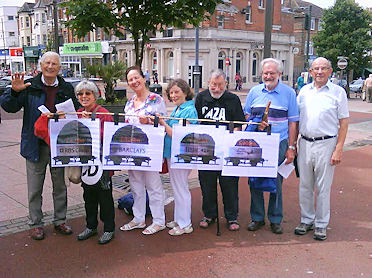
Saturday 19 July 2014 was the day on which local WDM members formed a ‘coal train’ to call at local branches of UK banks to remind them of their corporate responsibility for financing fossil fuel industries in the Third World. Since 2005 they have poured at least £12 million of our money into coal mining, pushing people off their land and destroying communities. Coal is exported to be used elsewhere, while many of the victims are among the 1.3 billion people with no access to electricity. See the report in Hastings Online Times
Day of Action against the TTIP – the Transatlantic Trade & Investment Partnership.
TTIP is being negotiated in secret in Brussels now, and 12 July 2014 was a national day of action, with events happening all over the country, including Bexhill. If you haven’t heard of TTIP already, it’s a new major EU-US trade treaty which has huge implications for democracy and public services, as it effectively opens up all public services to the market. Most importantly, it allows corporations to sue national governments if they attempt to regulate the market in favour of public spending, or to protect their citizens from market forces or from new technologies such as fracking and GM. It effectively rewrites the social contract between us and our governments.
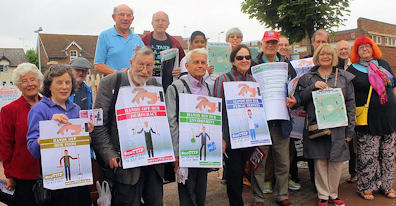
Together we raised awareness of TTIP and the implications for our health, education and social care services, and got people signing postcards against the corporate takeover.
‘The Scramble for Africa’
Members of the Bexhill and Hastings Group of the World Development Movement joined the campaign to stop multinational corporations from taking over African farmlands.
Slicing and scoffing the Africa-shaped cake.
In May they joined local UNA members at an organic garden in Bexhill. To symbolise the way in which global companies are slicing up Africa WDM members, dressed as City CEOs, shared a large Africa-shaped cake.
‘Dirty Energy’: Reclaim Power – Action on Energy
In October 2013 local members of the World Development Movement gathered outside the HSBC Bank, Devonshire Road, Bexhill, in a protest against the bank’s funding for fossil fuels.
In March 2014 they met with Bexhill and Battle MP Greg Barker to ask him to push for new rules to stop UK banks pouring billions of pounds into the global coal industry. Greg Barker is the Minister of State for energy and climate change.
The UK’s five biggest banks have invested £12 billion in coal mining around the world since 2005. Of all fossil fuels, coal has the most damaging effect on climate change.
The campaigners from the Bexhill and Hastings World Development Movement group also highlighted the devastating effects of coal on people living where it is mined. UK banks are financing a coal boom in Indonesian Borneo, which is destroying the forests and rivers indigenous people rely on. In Colombia, whole villages have been wiped off the map by the massive Cerrejón coal mine, also financed by UK banks.
In response, Greg Barker sent a letter saying he was pleased to have met with members of the group, and that he read the parliamentary briefing they gave him with interest. However his letter implies that he had missed the point. He wrote about discussing “the financing of coal-fired power plants”, which was not what the group talked about during their meeting. The group were very clear that they were calling on the government to stop UK banks bankrolling the coal industry and dirty mining projects.
Accordingly the group will be sending a letter to Greg Barker to clarify the reason they met and the contents of the parliamentary briefing.
WDM and Fairtrade at an interfaith event in St Leonards
Members of Bexhill and Hastings WDM and Fairtrade group held a stall at ‘A Garden Full of Cultural Delights’, an interfaith event organised by Hastings & District Interfaith Forum, Hastings Intercultural Organisation and Friends of St. Leonards Gardens. The group campaigned on both WDM’s Carbon Capital and Bankers Anonymous campaigns.
Bexhill and Hastings WDM Group celebrated its 13th birthday anniversary on 15th July 2013 by inviting Sarah Reader to tell us about WDM’s Carbon Capital Campaign. She explained that British banks are continuing to fund destructive fossil fuel projects. Current plans for mandatory reporting mean that financial and other firms have to report on emissions generated by lamps and equipment in their UK offices, but are still not required to disclose the carbon footprint of their investments in fossil fuel mining and trading.
We were encouraged to explore the interactive infographic showing links between government ministers (including our own MP Gregory Barker) and the financing of the fossil fuel industry.
Bankers Anonymous Campaign
Bankers are still gambling on commodity futures, driving up the price consumers must pay for food, especially in the Third World.
On a bright sunny morning, 1st June 2013, Bexhill and Hastings WDM were in Devonshire Road to encourage bankers to kick their addiction to gambling on the prices of staple foods. Many passers-by signed our cards.“Come and join our protestationCome and help us end starvationCome and ask for regulationEnd food speculation – NOW!“
Food Sovereignty Campaign
On 24th November 2012 Bexhill and Hastings WDM Group held a public meeting in Bexhill at which Miriam Ross, just back from Venezuela, presented a new film Growing Change. Venezuela has made food sovereignty a government priority, taking advantageof oil revenues to reduce their reliance on food imports, energy-based industrialised agriculture, chemical fertilisers and the market power of multinationals and supermarkets. Miriam told us about agricultural cooperatives which, by eliminating middlemen, have closed the gap between producers and consumers.
Food sovereignty is an idea whose time has come, not only for Venezuela and the Third World, but for Europe too.
Local Campaigning, Summer 2012

The UN Earth Summit: “Rio + 20”The UN Earth Summit took place in Rio in June 2012. A key theme of the conference was the “Green Economy”. This could have been a very positive agenda that prioritised economic justice and sustainable development. But the version being promoted by the British Government could be deadly for the world’s people and our planet. Read WDM’s verdict.On 2nd June, at the United Nations Association’s annual Open Garden Coffee Morning, Allan Bula, on behalf of UNA, and Denis Lucey, on behalf of WDM, signed a Declaration in Support of Rio. Callie Lister of Friends of the Earth, on behalf of the Stop Climate Chaos Coalition, recorded a message from Barbara Echlin for Bexhill MP Greg Barker to hand to Nick Clegg before he departed for Rio.
 Climate Justice for Africa?
Climate Justice for Africa?
Minister of State for Climate Change Gregory Barker, Bexhill’s MP, faced questions from a local coalition of charities and environmental campaign groups at an ‘African Climate Connection’ event ahead of the United Nations conference in Durban, South Africa. The event took place on Saturday 26 November 2011 at St Peter’s Church, Bexhill, a few days before Mr Barker flew to Durban to participate in the negotiations.
Gregory Barker said ‘I am concerned about the lack of urgency at the climate talks. The COP climate conferences are becoming a way of life for some people. We need to look at the science. In Durban I want to close the gap between countries’ pledges and what scientists say we need.’ He pledged to work for global agreement for a single legally binding treaty to keep temperature rises below 2° while acknowledging how difficult this will be. He also wanted to move forward the work on climate finance, adaptation and protection of forests started at Cancun.
The group called for the government to take a lead at the climate talks by ensuring more finance is made available for developing countries to adapt to the effects of climate change, develop low carbon economies and protect forests. To highlight their ‘No New Chains of Debt’ campaign, the Bexhill World Development Movement group presented Mr Barker with a long paper chain bearing messages demanding climate aid be given as grants, not as loans and for the money to be channelled through the new green climate fund instead of the World Bank. Denis Lucey of the WDM said, ‘Climate change has largely been caused by rich industrialised countries like the UK. Poor countries like Bangladesh, Nepal and Mozambique desperately need funds to help them deal with climate change, but the World Bank loans being pushed by our government will only drive them deeper into poverty. We urged Greg Barker to take our concerns to the UN talks and help ensure that solutions to climate change also tackled poverty. Otherwise they wouldn’t work.’
Christian Ecology Link Secretary Barbara Echlin ended the meeting with a strong plea to the minister to fight hard for the vital global deal that the world needs if we are to avoid climate chaos, storms and droughts.
The event was attended by over 60 people and supported by a mix of local branches of national charities and agencies, and locally based groups: Bexhill Environmental Group, Cafod, Christian Aid, Christian Ecology Link, Fairtrade Bexhill, Friends of the Earth, Operation Noah, Rother Environmental Group, Tearfund, United Nations Association and World Development Movement.
Denis Lucey said, ” Climate change has largely been caused by rich industrialised countries like the UK. Poor countries like Bangladesh, Nepal and Mozambique desperately need funds to help them deal with climate change, but the World Bank loans being pushed by our government will only drive them deeper into poverty. We are asking Greg Barker to take our concerns to Westminster and help ensure that solutions to climate change also tackle poverty. Otherwise they won’t work”.
Summer 2011: Our summer campaign was against food speculation. View this new video from Australia.
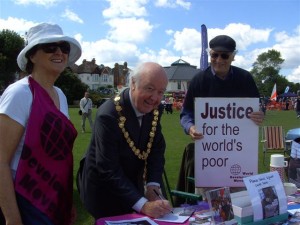

July 2011: Hastings Mayor at WDM stall
You too can join the campaign against food speculation. Sign the WDM petition online – now! Then sign this French petition against land grabs in Madagascar. A Challenge to our MP We call on Greg Barker, our local MP, to reflect the voices of hundreds of his constituents as he leads debate on a new Government Bill in Parliament. Local people have backed a petition expressing their concern that the Government’s Energy Bill is too weak to deliver the energy savings in homes and communities needed to cut rising fuel bills and dangerous climate changing emissions. Mr Barker has a crucial role in shaping the legislation as Climate Change and Energy Minister. He has already listened to constituents and nationwide calls for improvements to the Bill – for which we congratulate him. However, we need him to go further. In particular: · Give councils the independent advice they need to tackle climate change, and ensure every council has a plan to help communities go green. · Protect tenants from living in cold, energy-leaking rented homes by 2016, and strengthen energy efficiency standards over time. · Ensure that Government has a plan for every home to be insulated. These measures would support local efforts by Rother District Council to tackle fuel poverty and would help to create green jobs across the District. Greg Barker made clear his commitment to these issues at a recent public meeting in Battle. Now we’re asking him to ensure the Government’s Energy Bill delivers the legacy of decent standard homes and effective council action on climate change needed. Brenda Pollack (Friends of the Earth, South East Regional Campaigner) Barbara Echlin (Christian Ecology Link and Operation Noah) Christina Lucey (CAFOD) Denis Lucey (WDM) Christopher Strangeways (Rother Environmental Group) Wendy Gubby (Christian Aid) Allan Bula (Bexhill and Hastings United Nations Association)
Public Meeting with Gregory Barker, MP, Minister for Energy and Climate Change
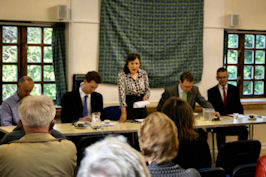
A public meeting in Battle, Sussex, on 20th May gave constituents a chance to challenge our MP, Gregory Barker, the Minister for Climate and Energy. This meeting was arranged by local representatives of the national organizations who are part of the Stop Climate Chaos coalition, and members of local environmental groups: Bexhill Environmental Group, Cafod, Christian Aid, Christian Ecology Link, Friends of the Earth, Operation Noah, Rother Environmental Group, Tearfund, United Nations Association, and the World Development Movement.
Paul Cook, of the Tear Fund, pressed the Minister to urge the World Bank to invest in renewable energy and stop subsidising fossil fuel. Martyn Williams, of Friends of the Earth, encouraged him to improve insulation standards for existing homes. Chris Rowland of OVESCo, an agency for sustainable energy, pressed him to continue the provision of feed-in tariffs for renewable sources of electricity.
TARGETTING BARCLAYS
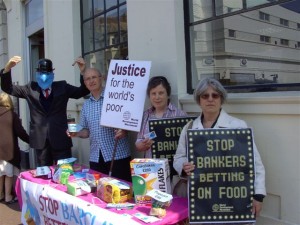
April 2011 was a month of action against Barclays. Barclays Capital is the UK’s prime culprit in food speculation, creating hunger by pushing up the price of key staple foods. Food prices have risen in the UK, but the effect in poorer countries has been devastating. There people are forced to spend most of their income on food just to stay alive. Barclays AGM was held in London on 27 April, so the local WDM group held a surprise stunt outside Barclays Bank, Bexhill on Tuesday 19 April. Local WDM chairman Denis Lucey dressed up as a banker, with a Barclay Eagle mask to attract attention.
Bexhill was privileged to stage a session on Tackling Global Hunger on Saturday 12 March, organised by local groups WDM and Bexhill Fairtrade as part of discovering how to solve a most urgent and drastically worsening problem of our age.
Before a large, inquiring audience, Heidi Chow of the World Development Movement gave a series of insights into the futures contracts which were brought in over 200 years ago to help farmers manage their risks. These contracts, which safeguarded basic foods, were deregulated in the 1990s, resulting in reckless speculation by wealthy bankers, causing the price of basics such as wheat, maize and rice to escalate.There is no shortage of food in the world but high prices mean that there is starvation. The reality of poverty and how earnings are spent was illustrated by a lady working on a rubbish tip in Kenya and having to spend most of her income on a bag of maize, with little left for other necessities; equivalent to someone here earning £300 a week and having to pay £250 for bread. An important point emphasised by Heidi is that money is not the answer to world poverty. Systems and attitudes have to change. She urged those present to support WDM’s campaign for regulation of reckless speculation on food by wealthy bankers.
- Alex Yeboah-Atari
Alex Yeboah-Atari was able to explain just how fair trading has changed the whole quality of life, educational , medical and environmental on the Banana Estates at the River Volta in Ghana. He wanted to pass on appreciation to all for supporting Fairtrade. He showed how it does work.
Hannah on behalf of Fairtrade Foundation congratulated Bexhill on their wonderful promotion of Fairtrade. She emphasised that in times of economic downturn like the present one, it’s no use telling people to tighten their belts if there is no room left to tighten! Fairtrade is a robust economic model; where it is in operation there is far less reliance on aid, so trade not aid is the answer.
The Mayor, Councillor Jimmy Carroll, welcomed our learned and personable visitors to our town and thanked them for their contributions.
